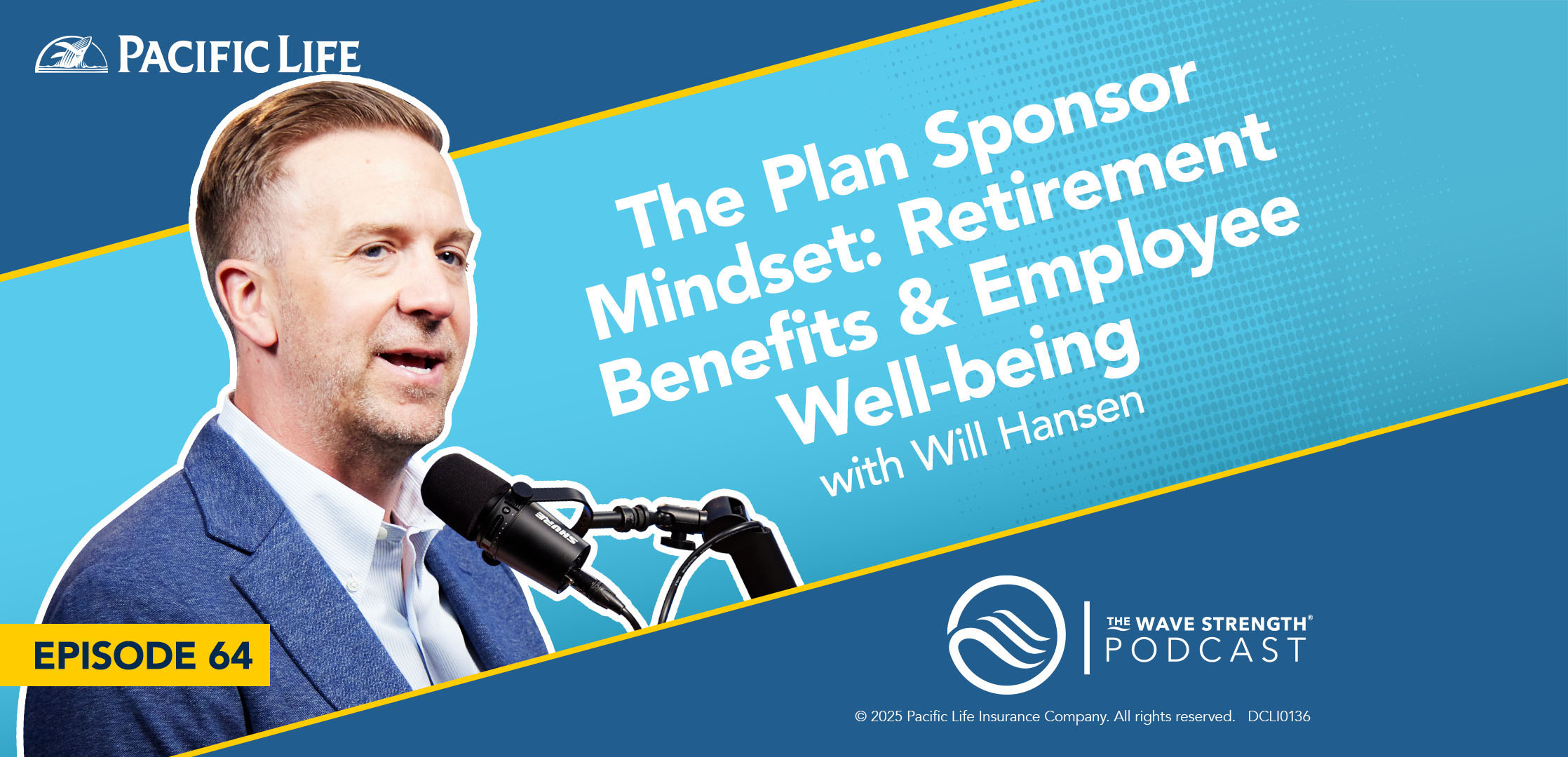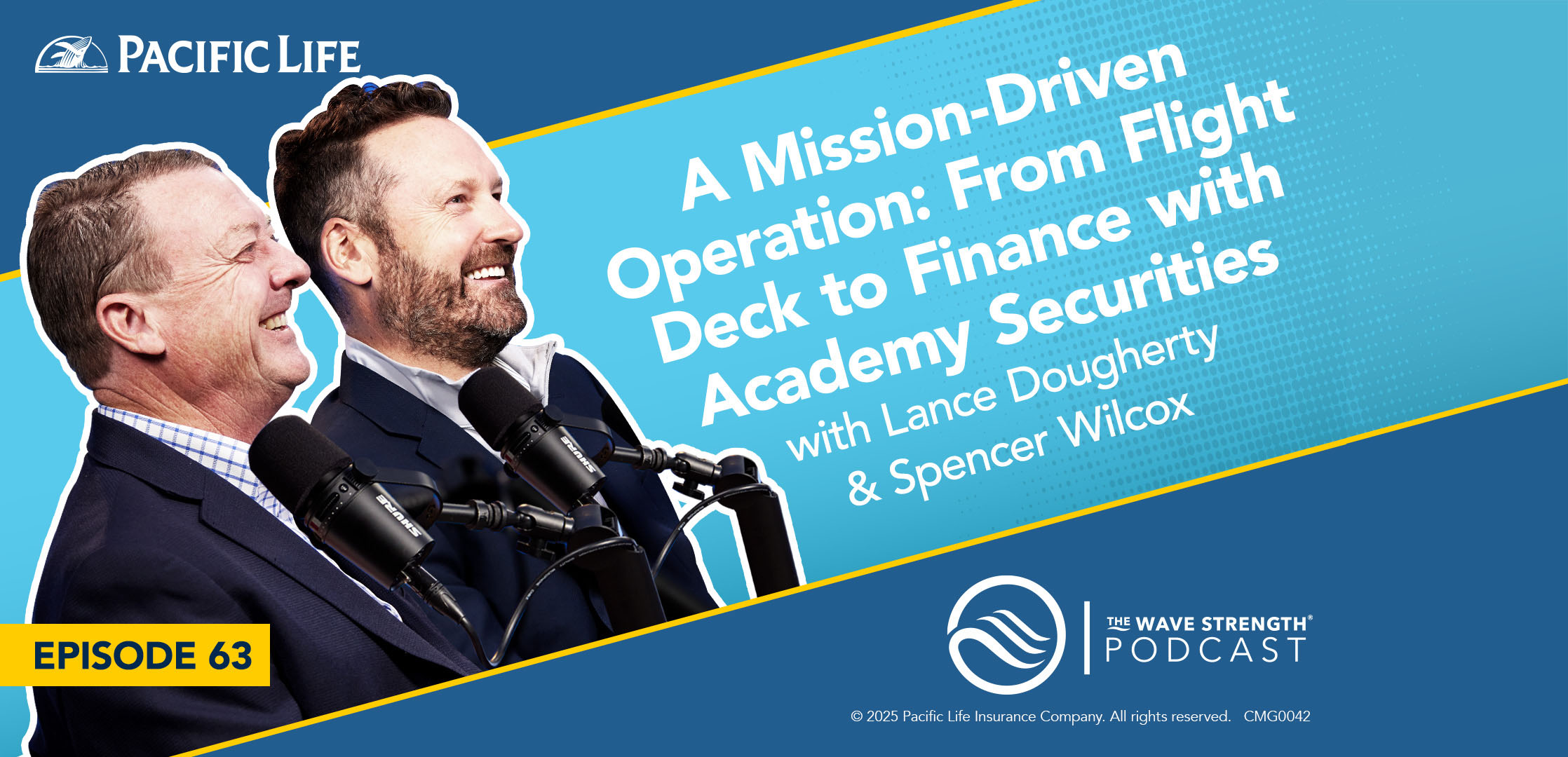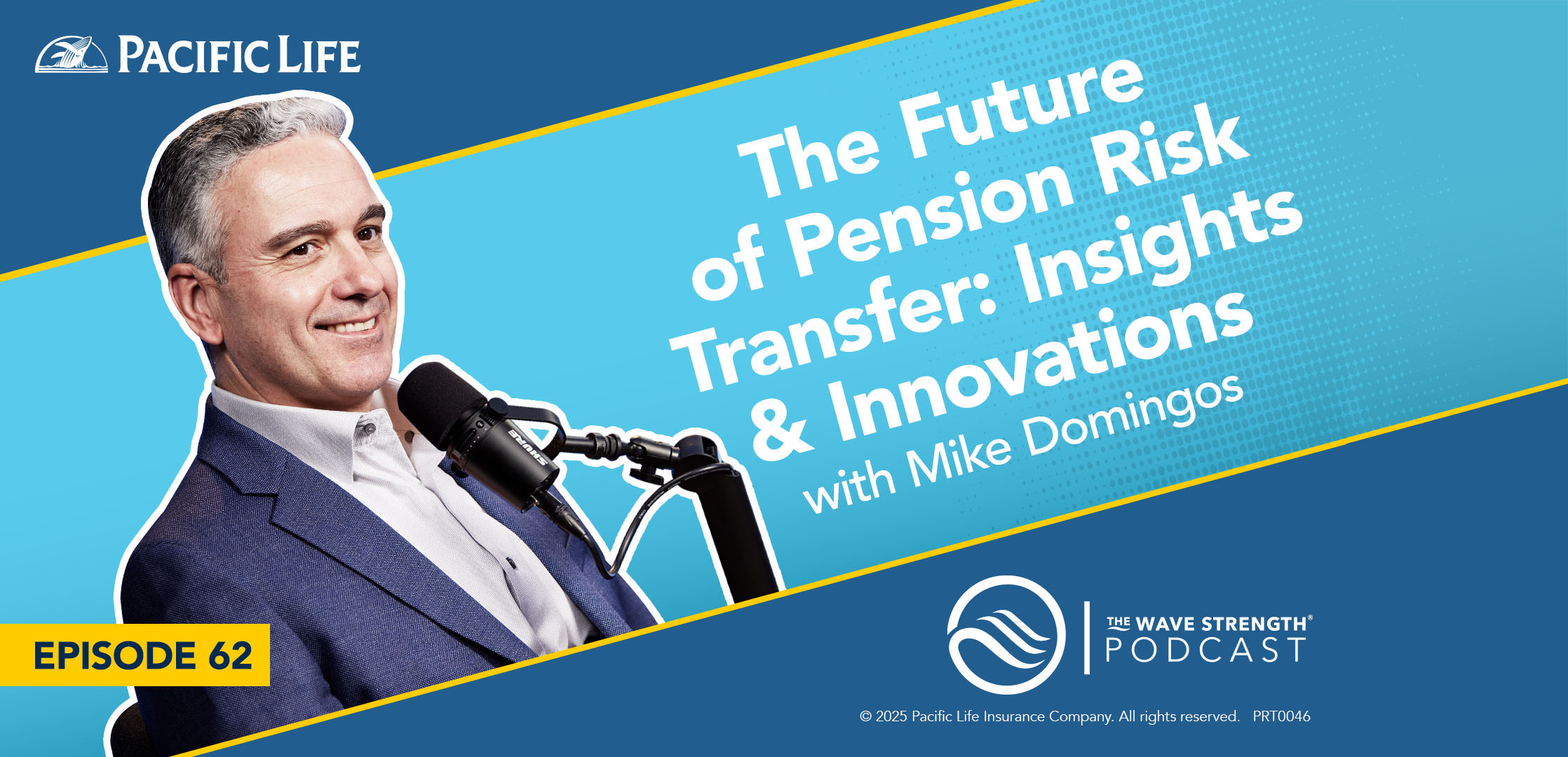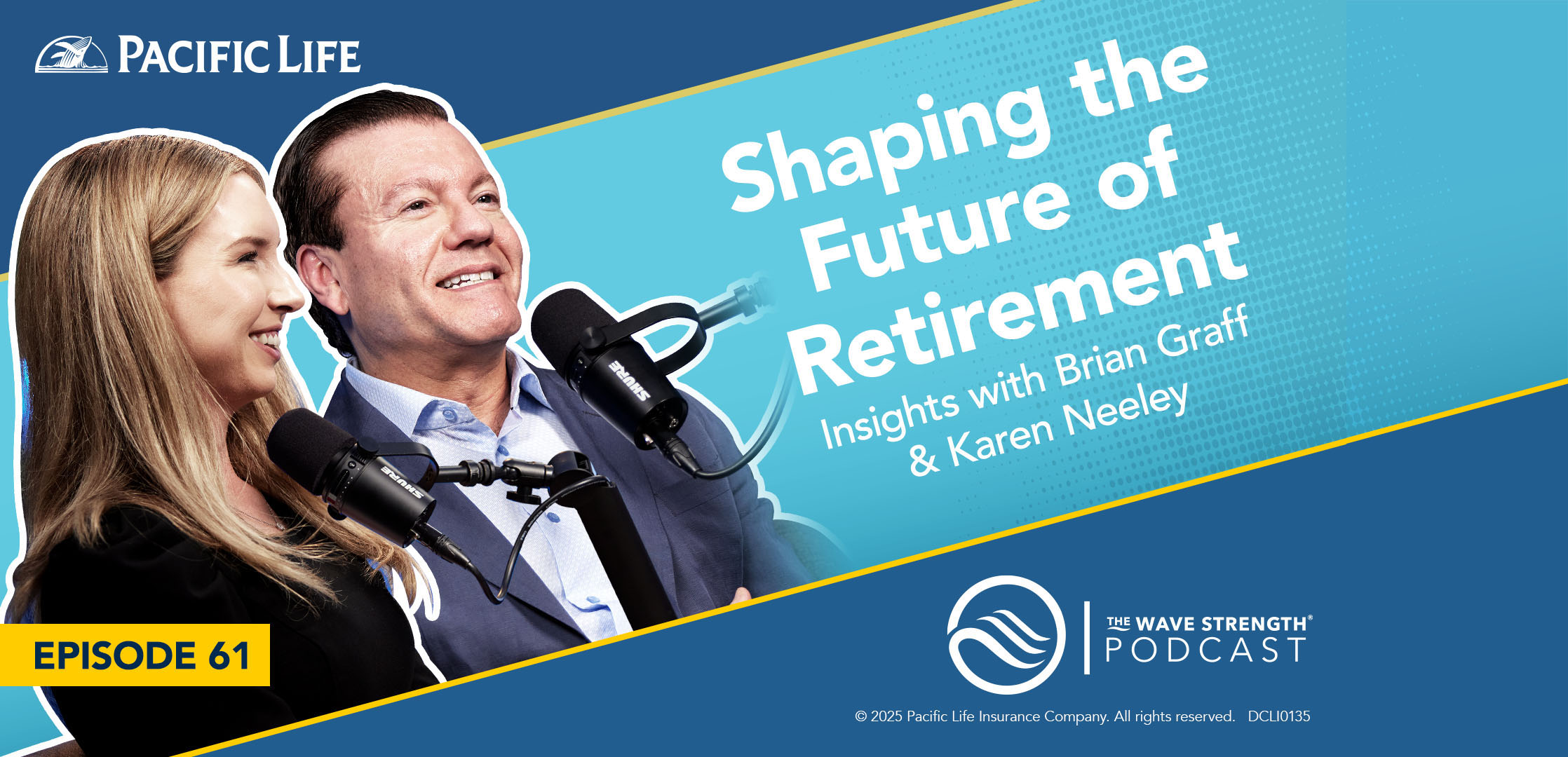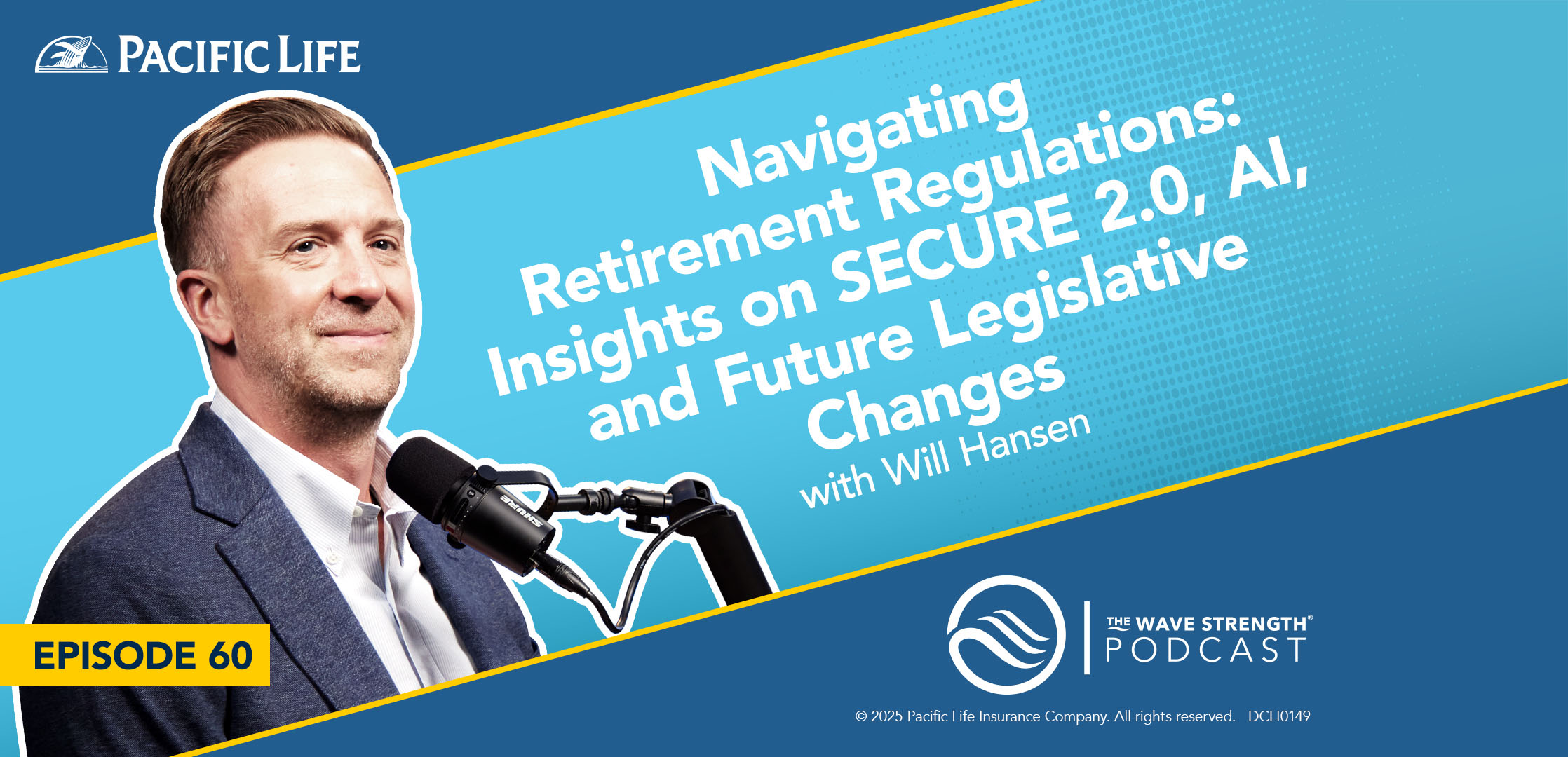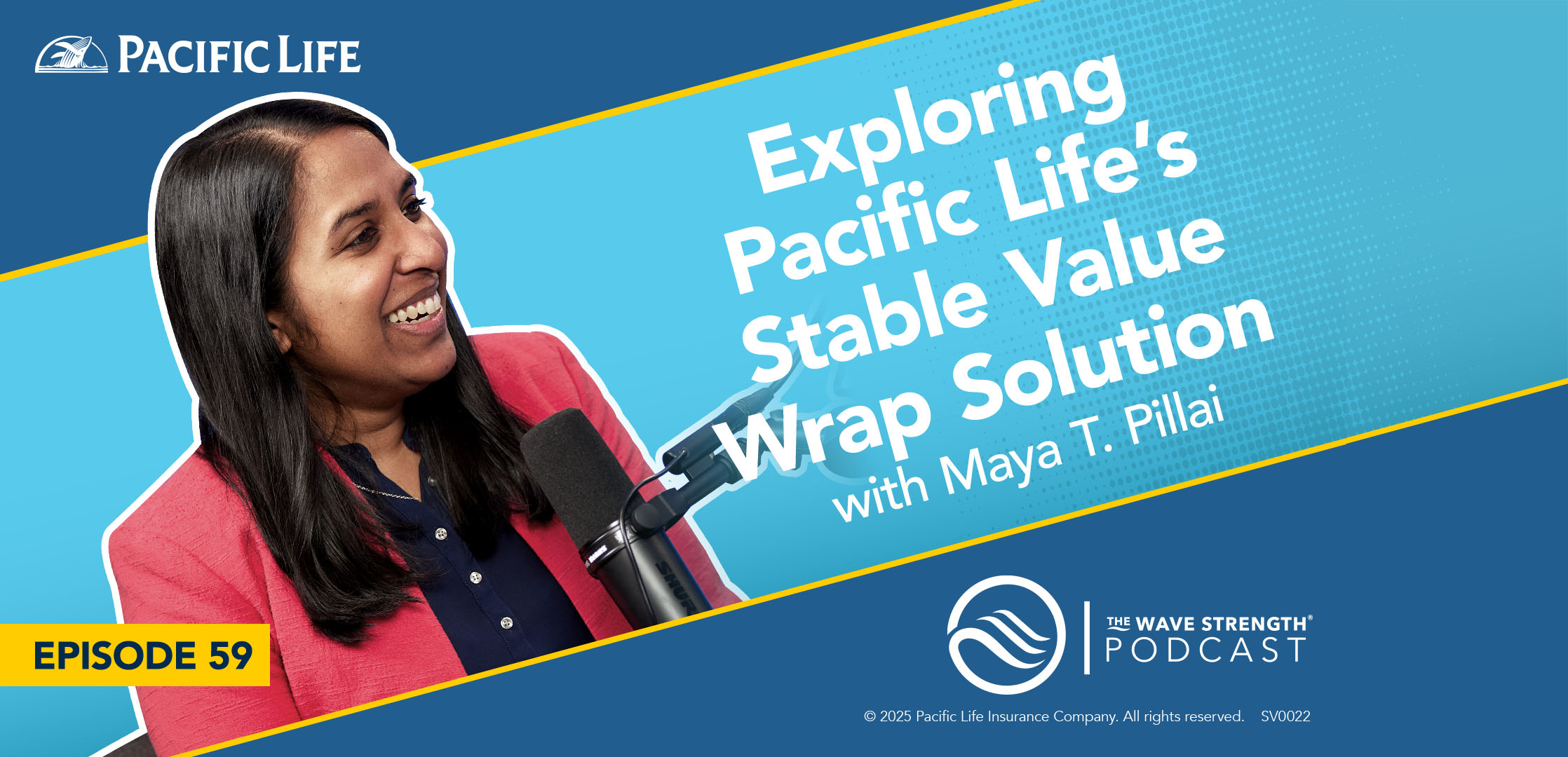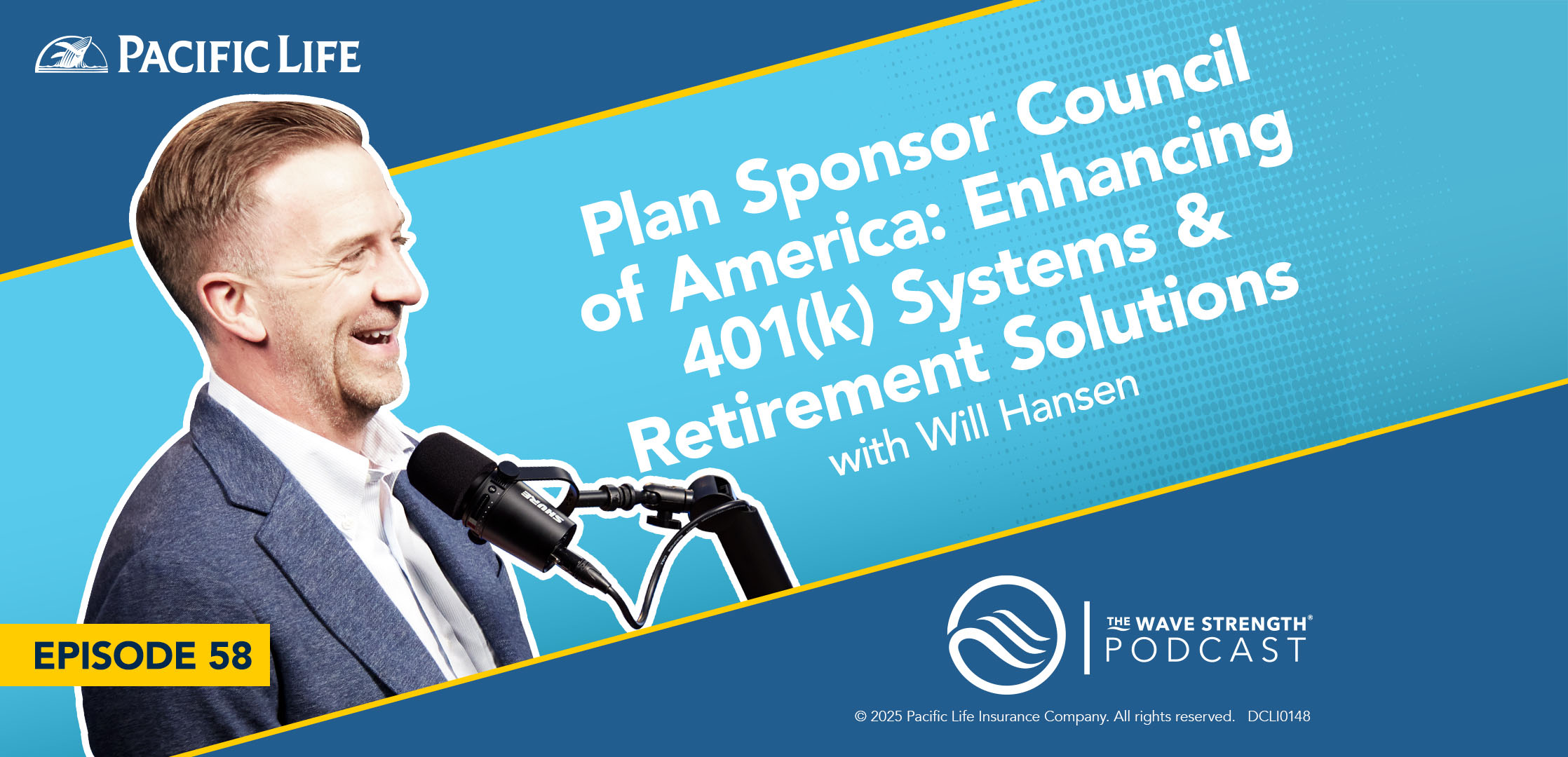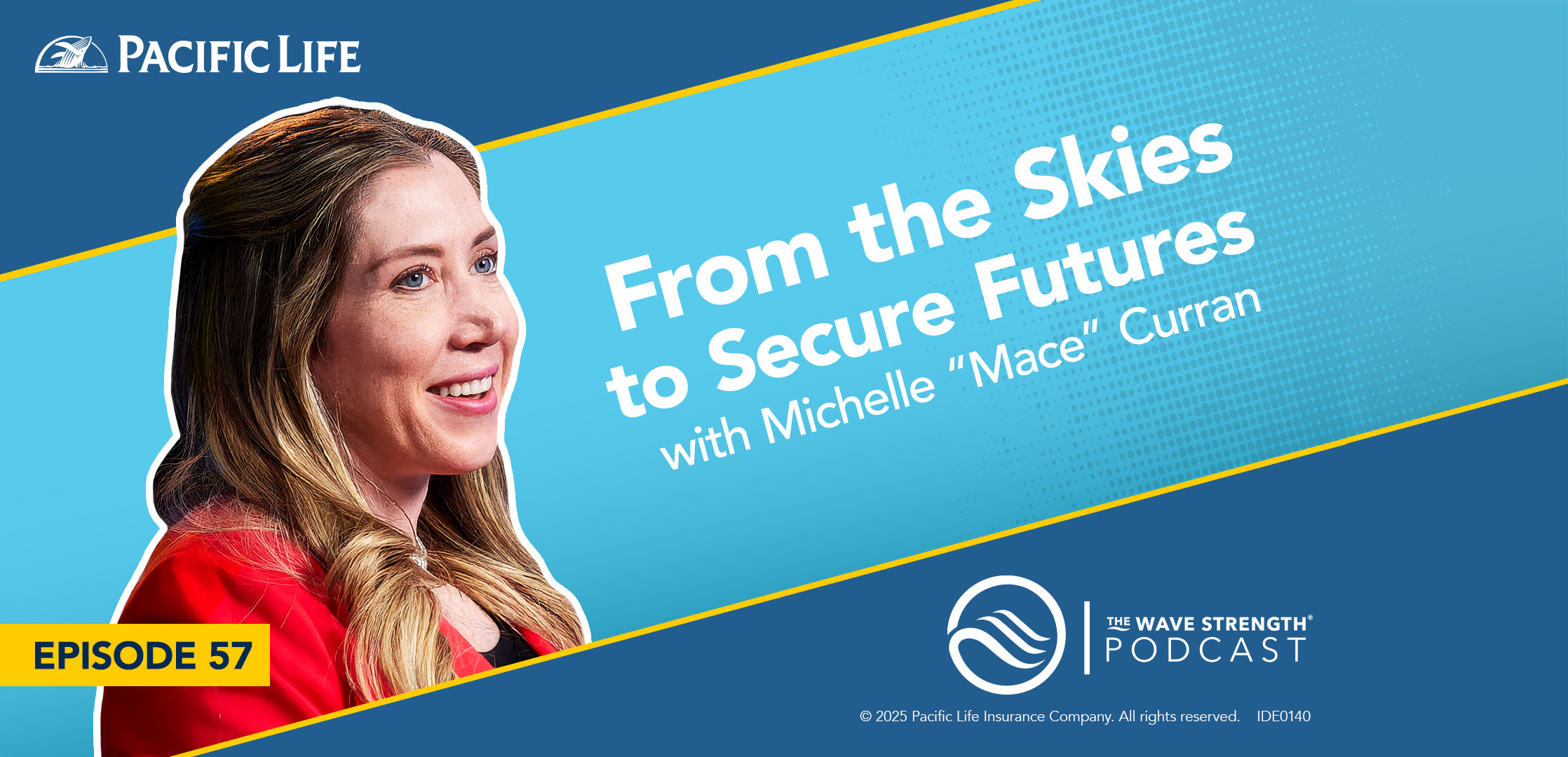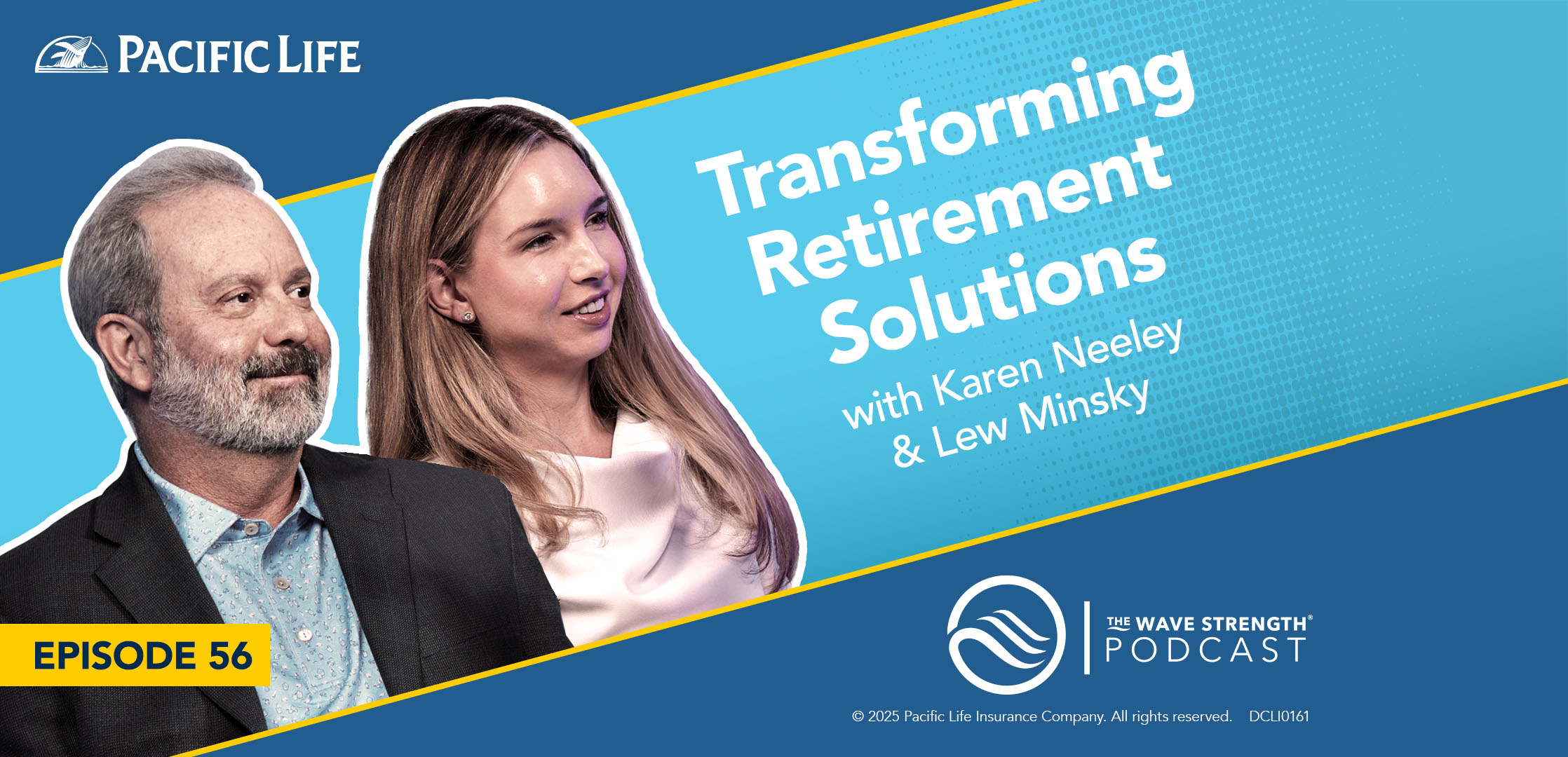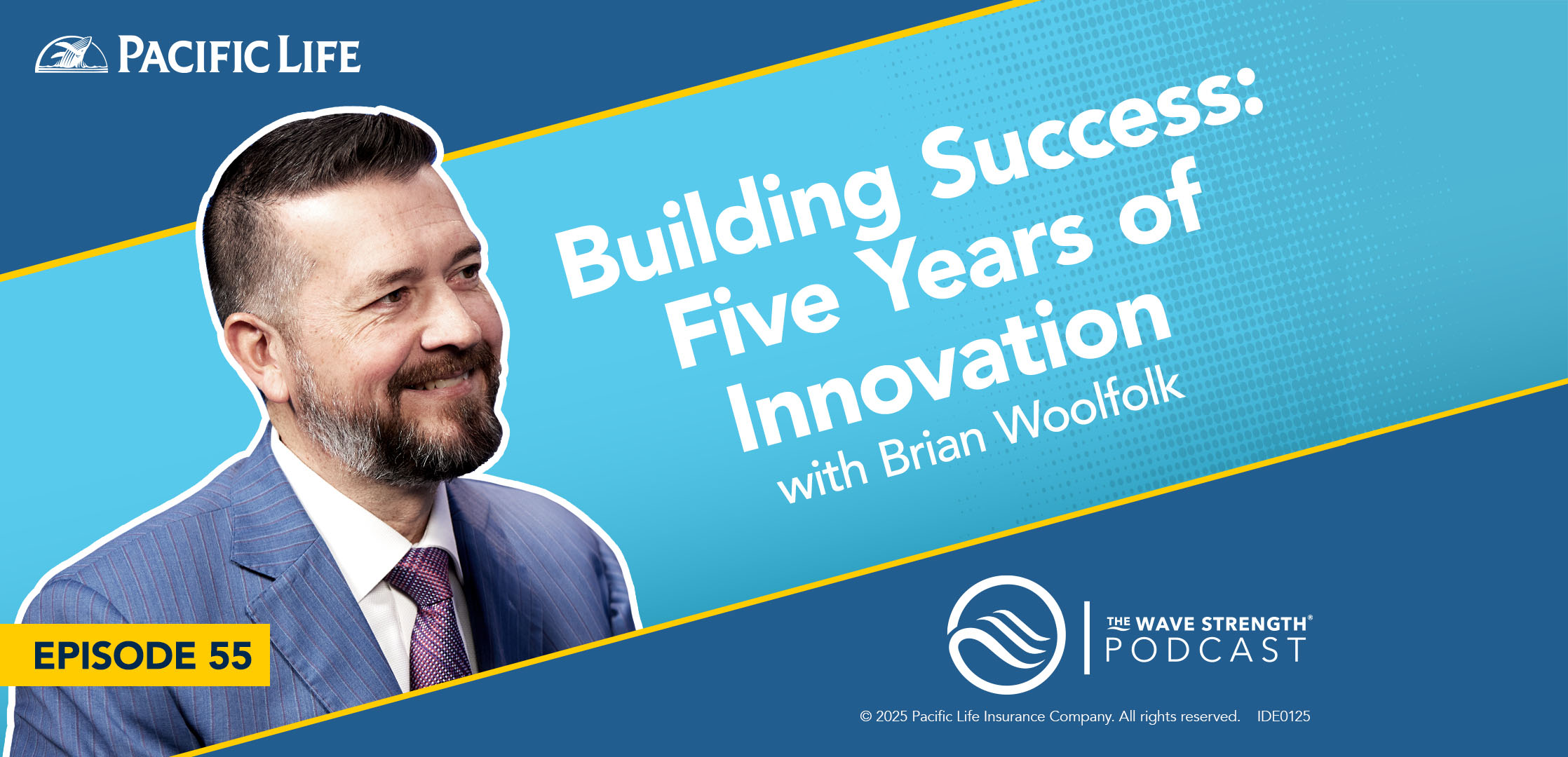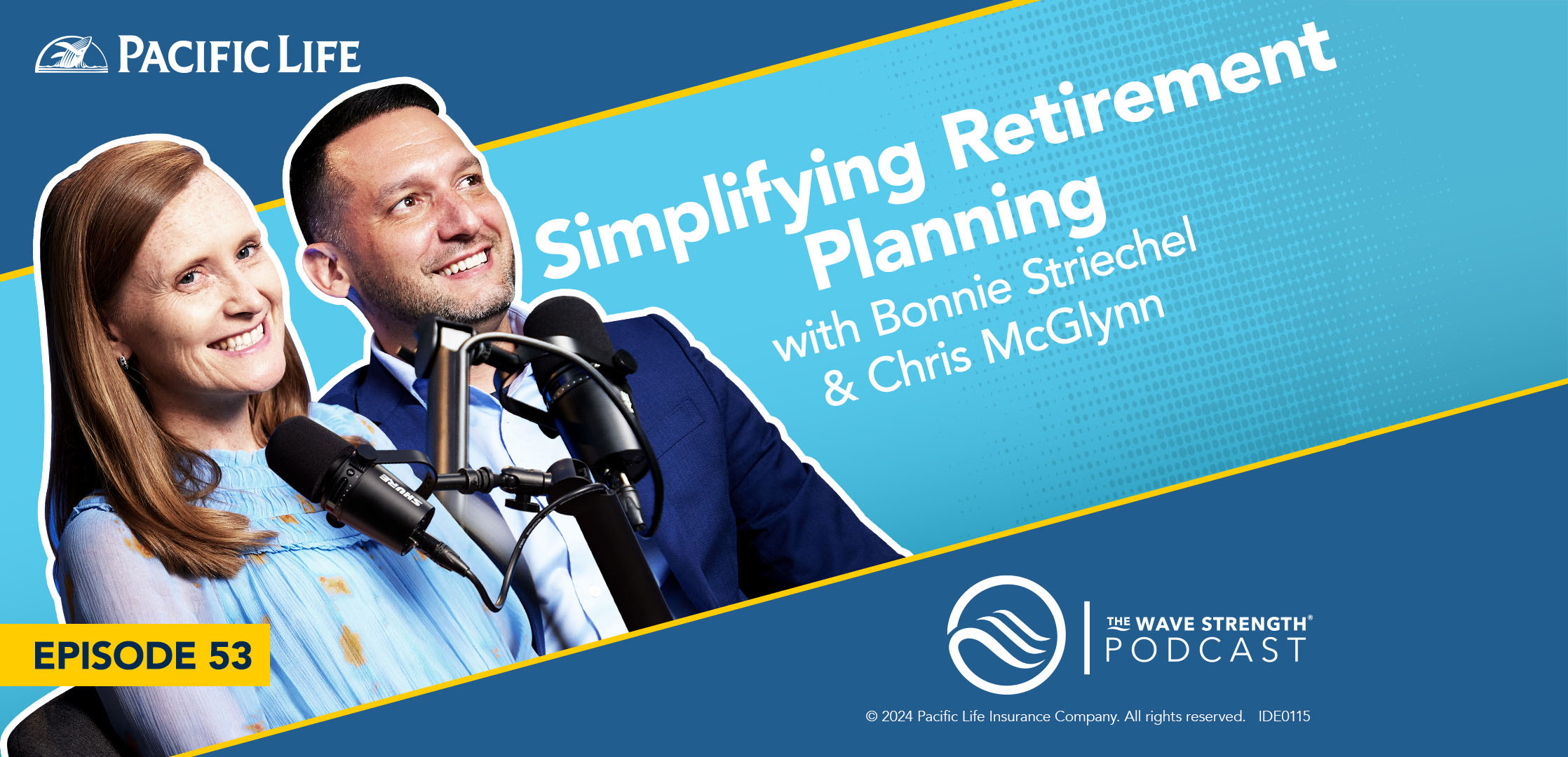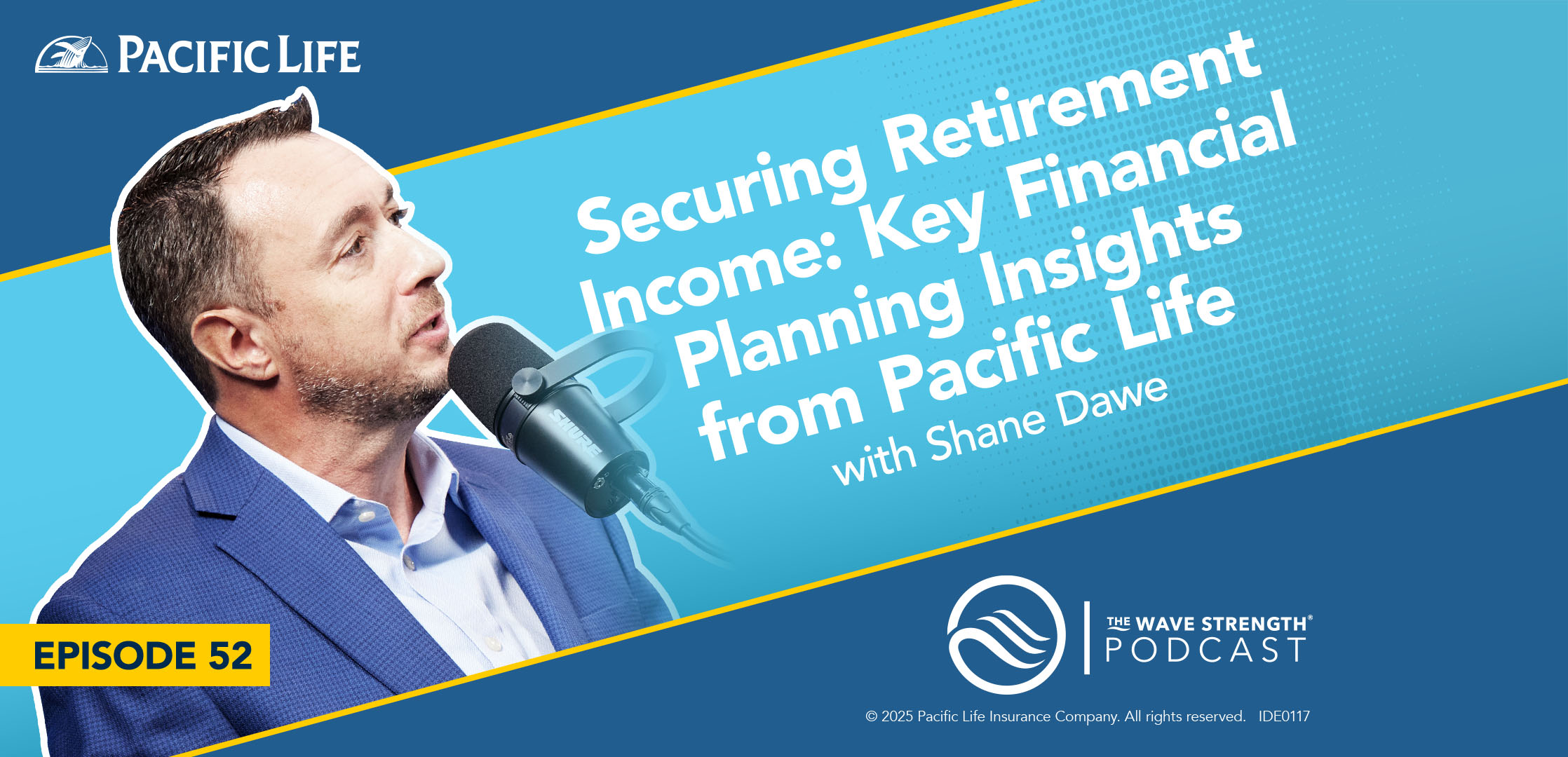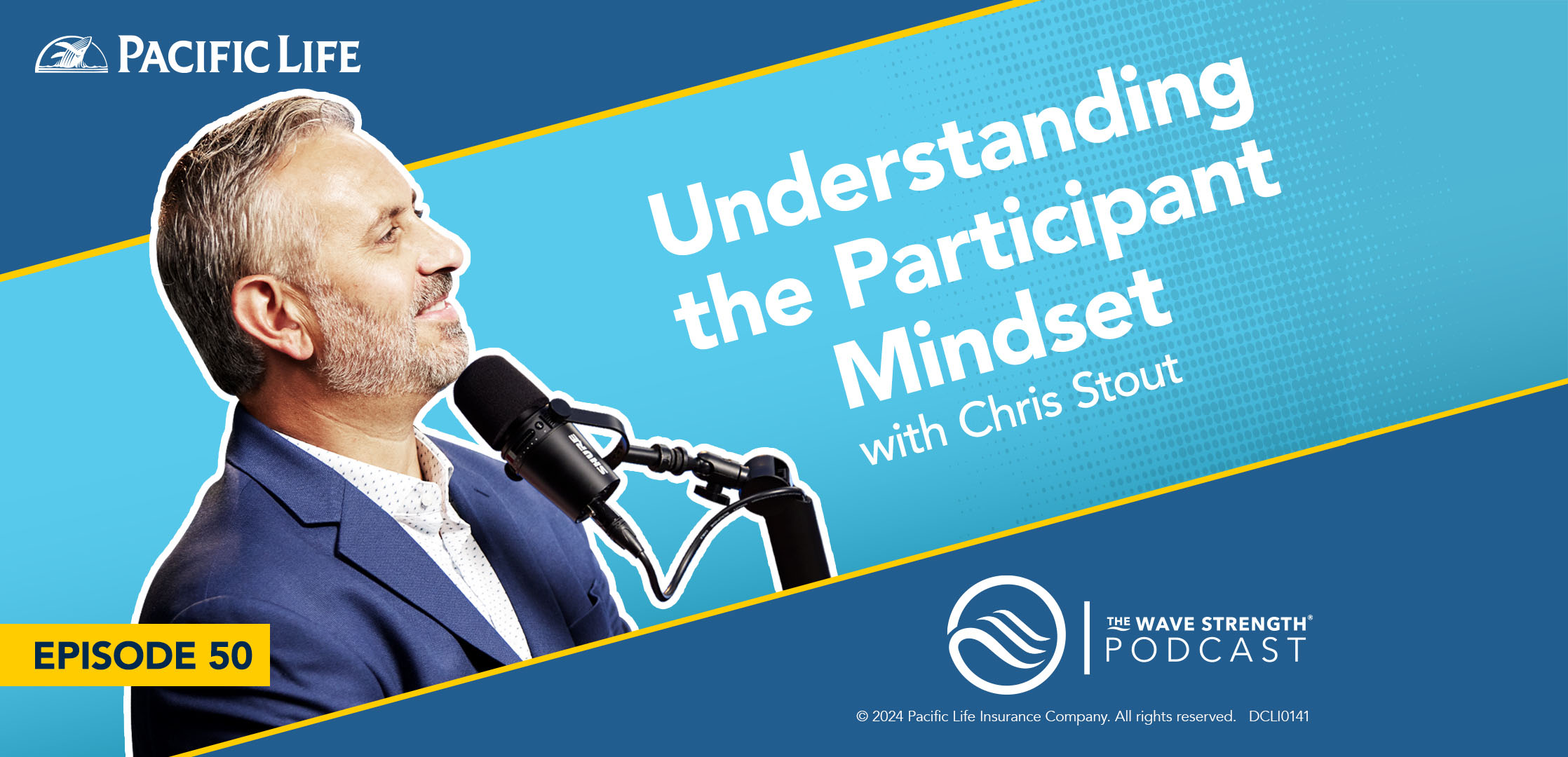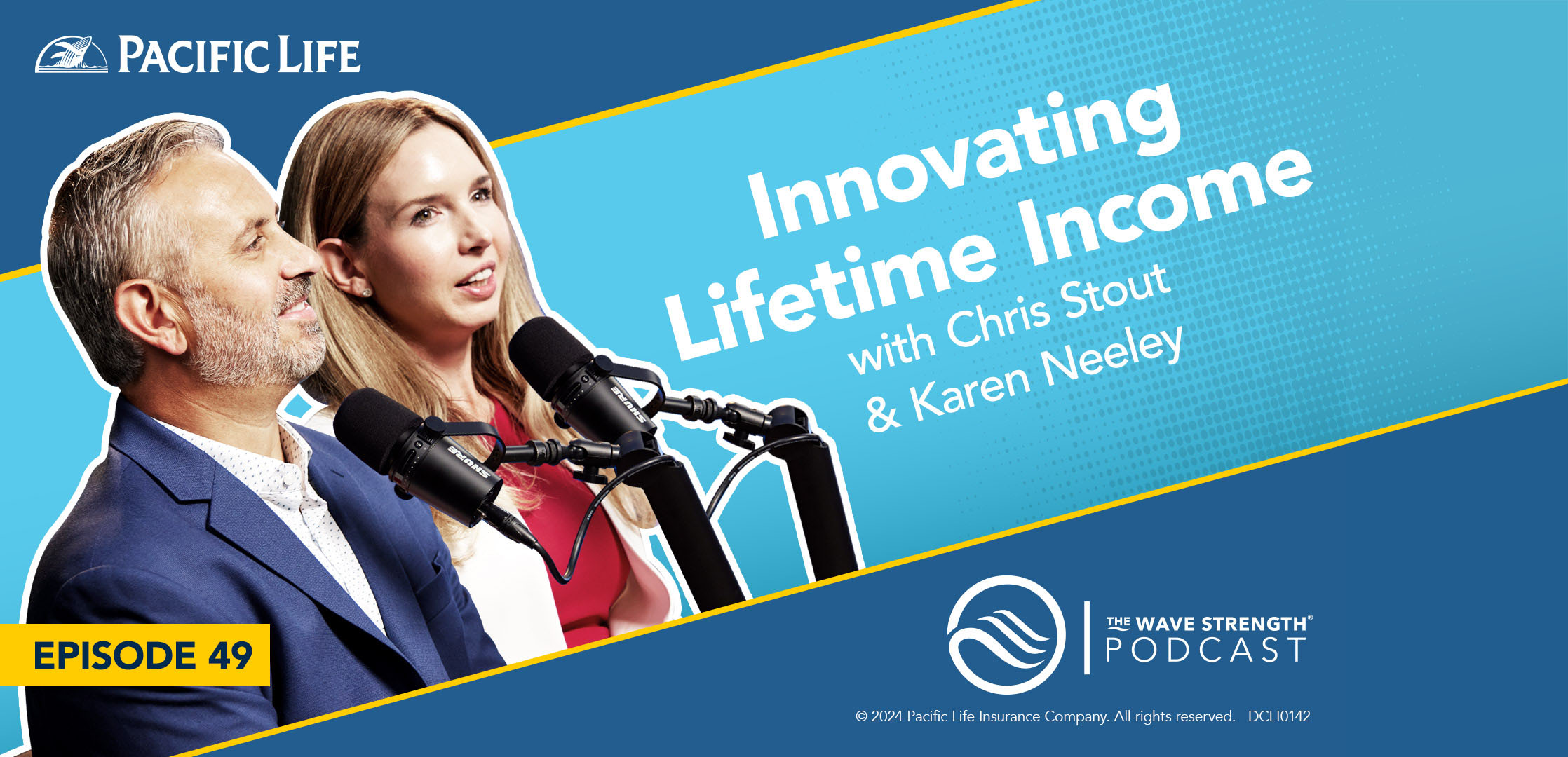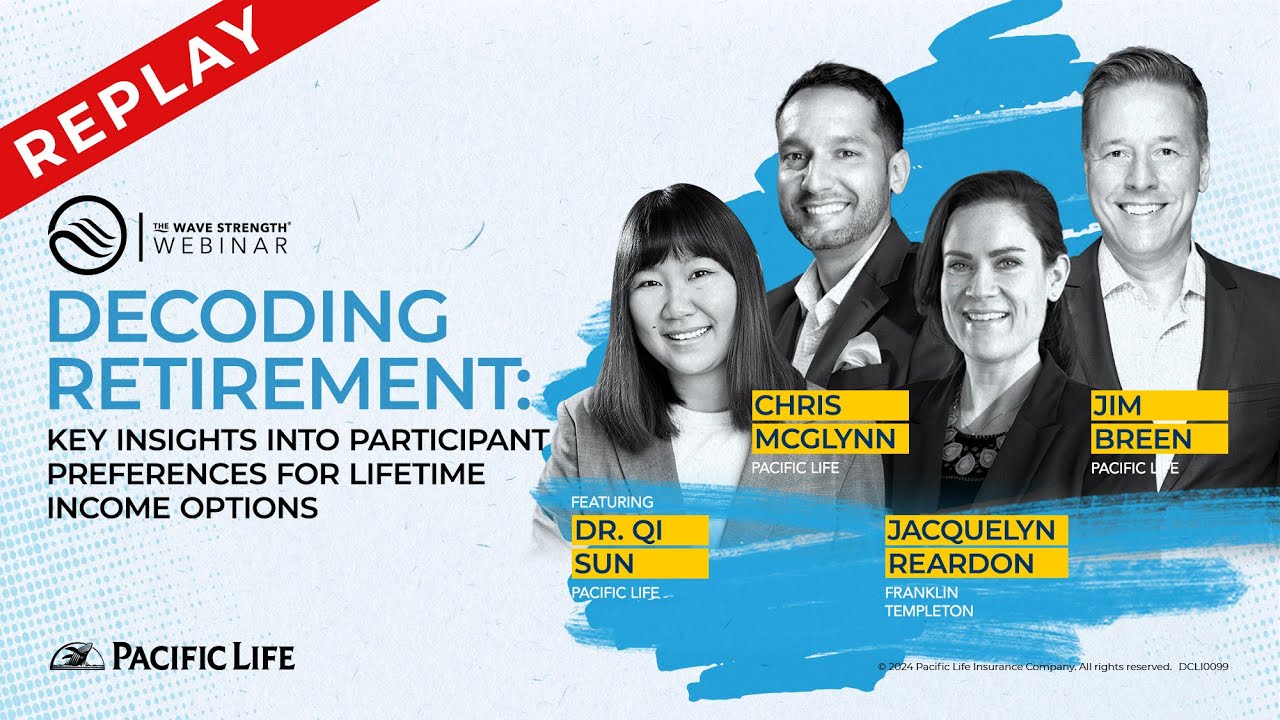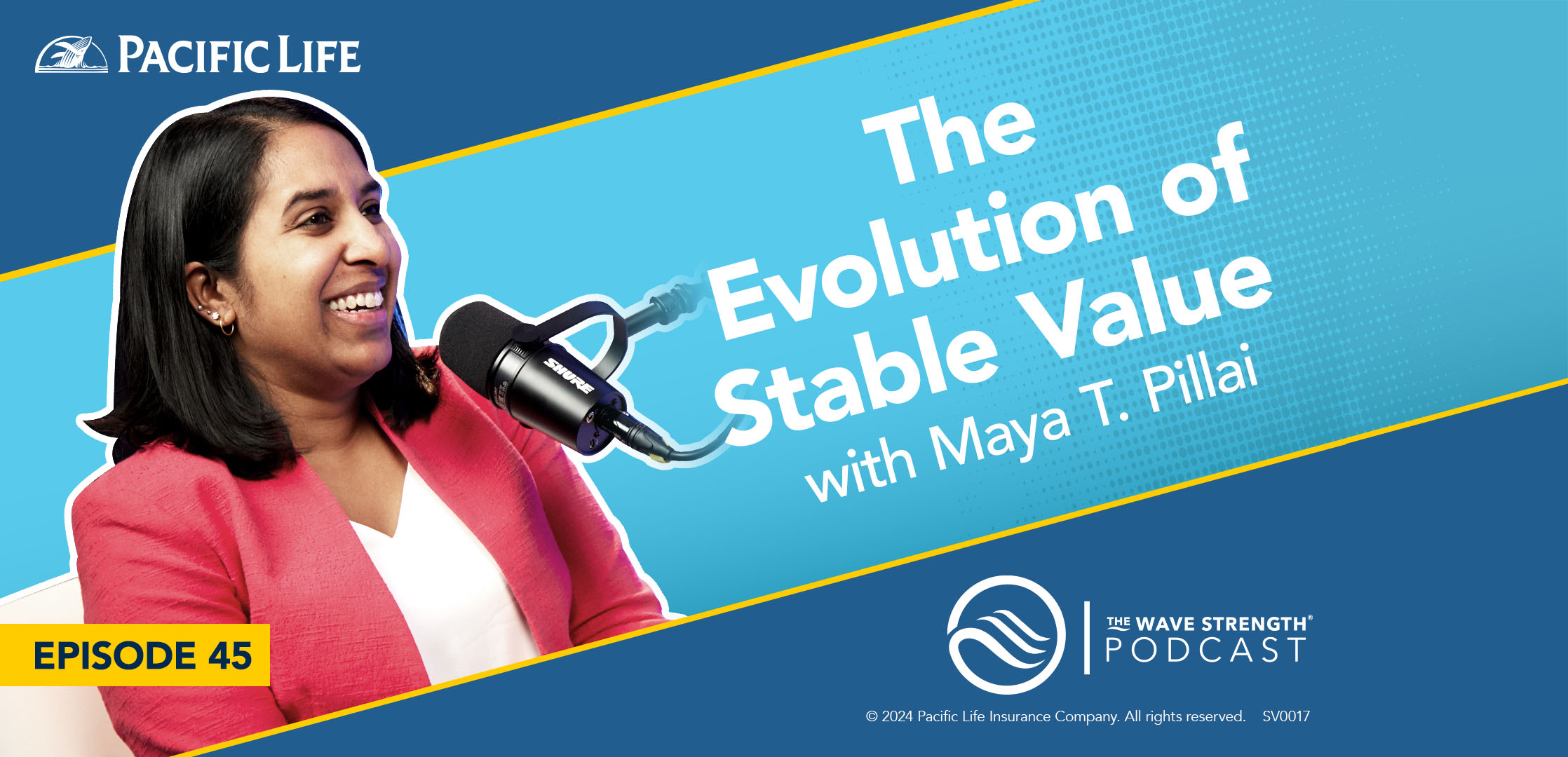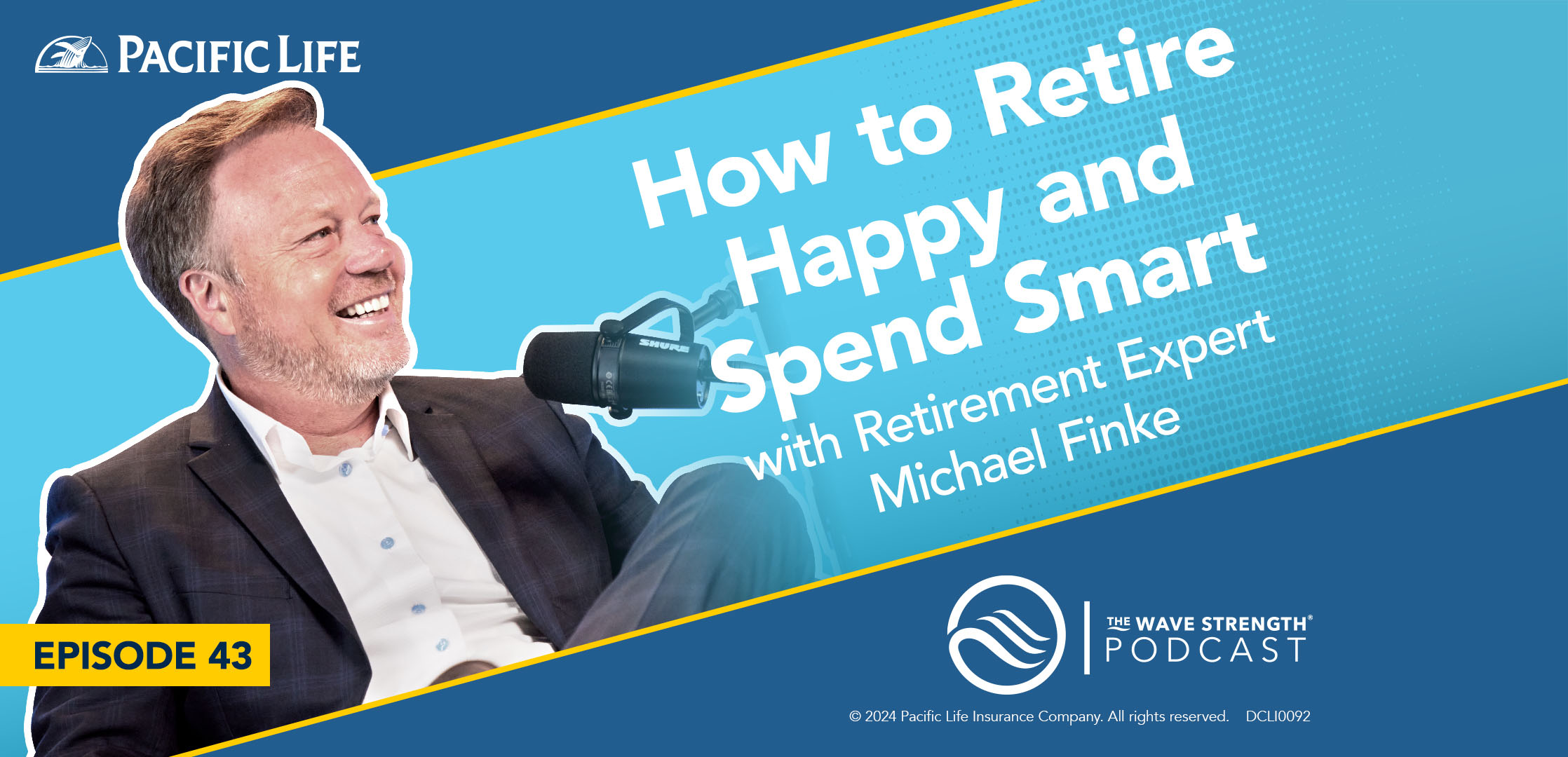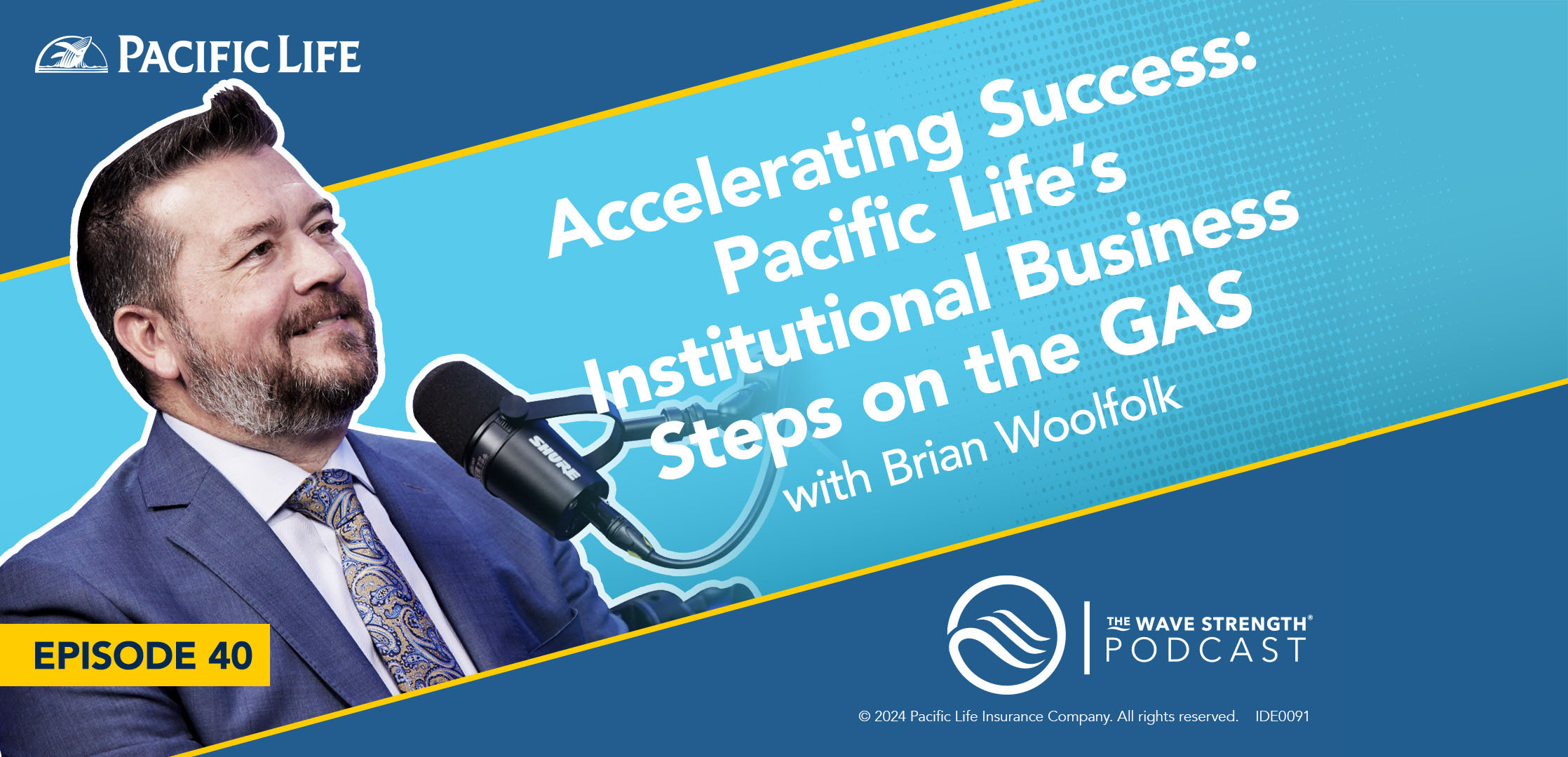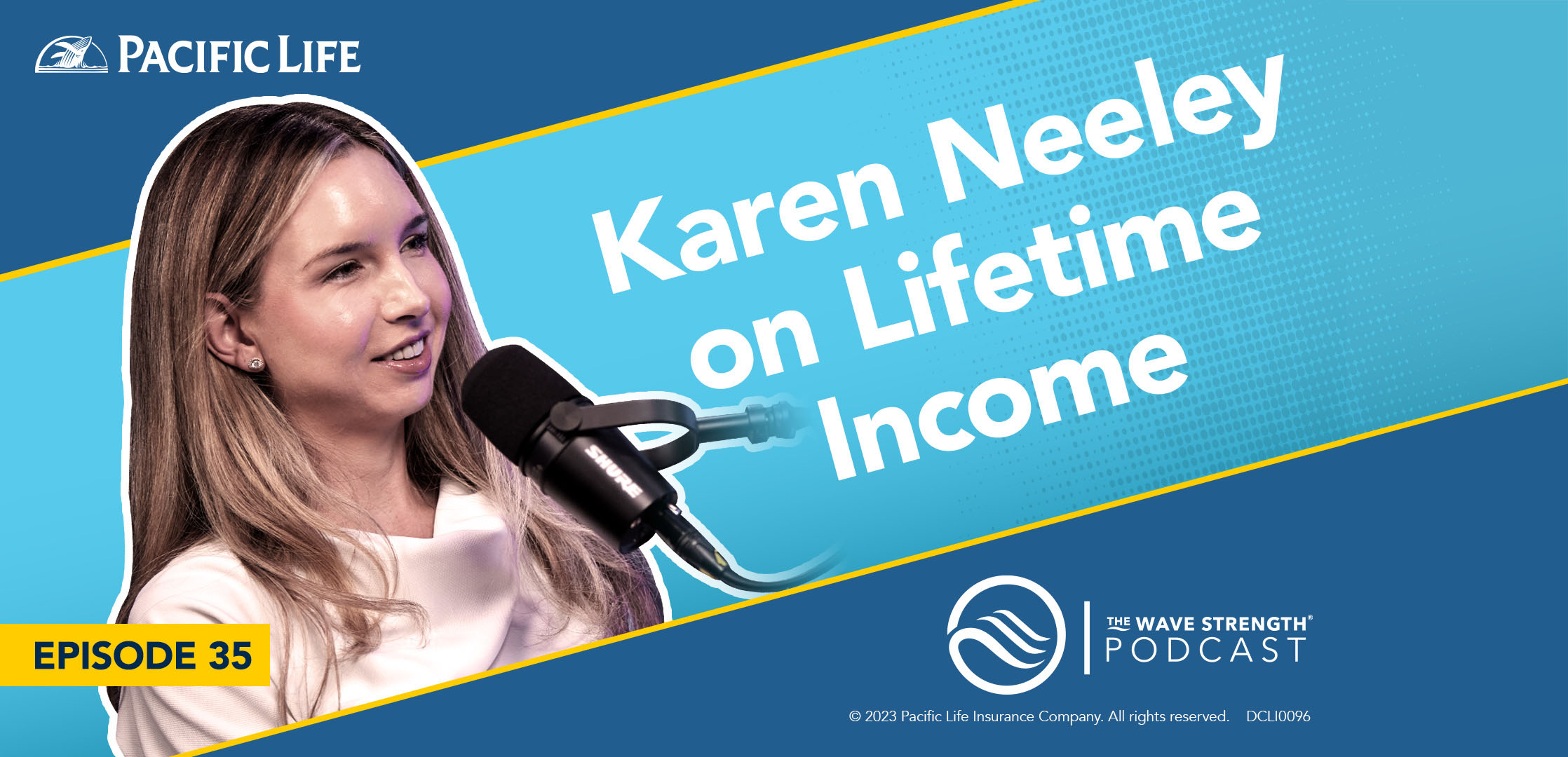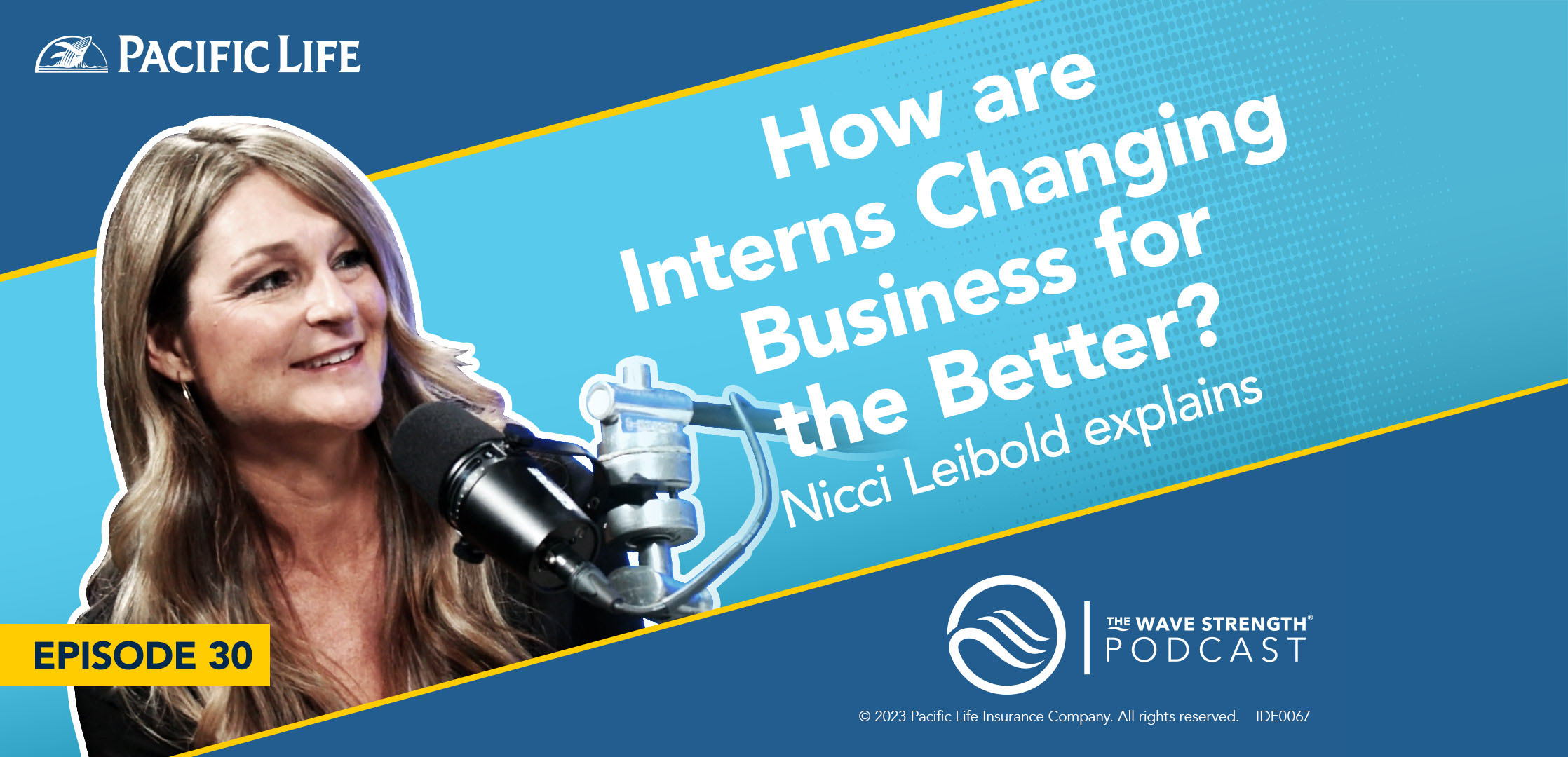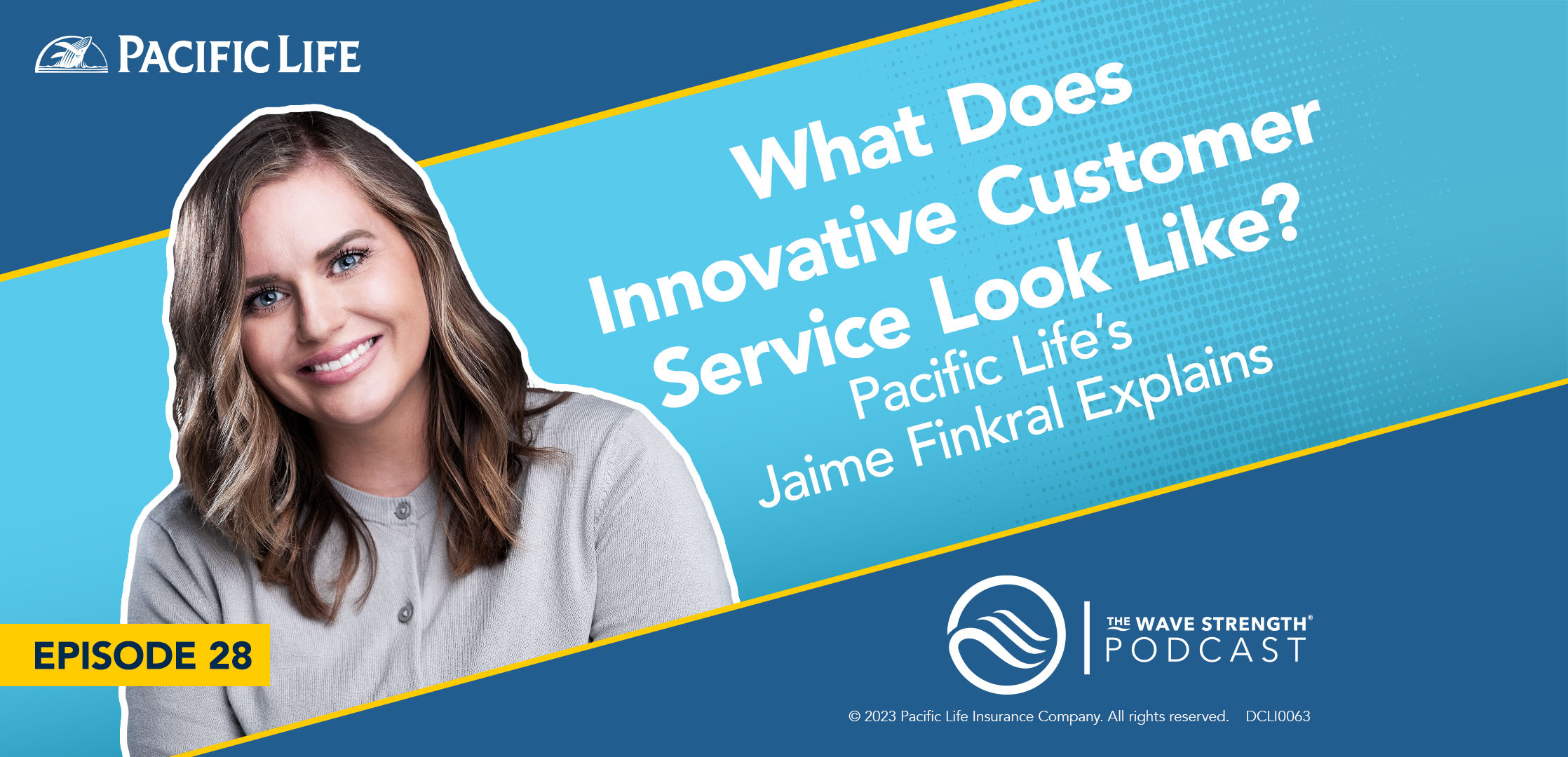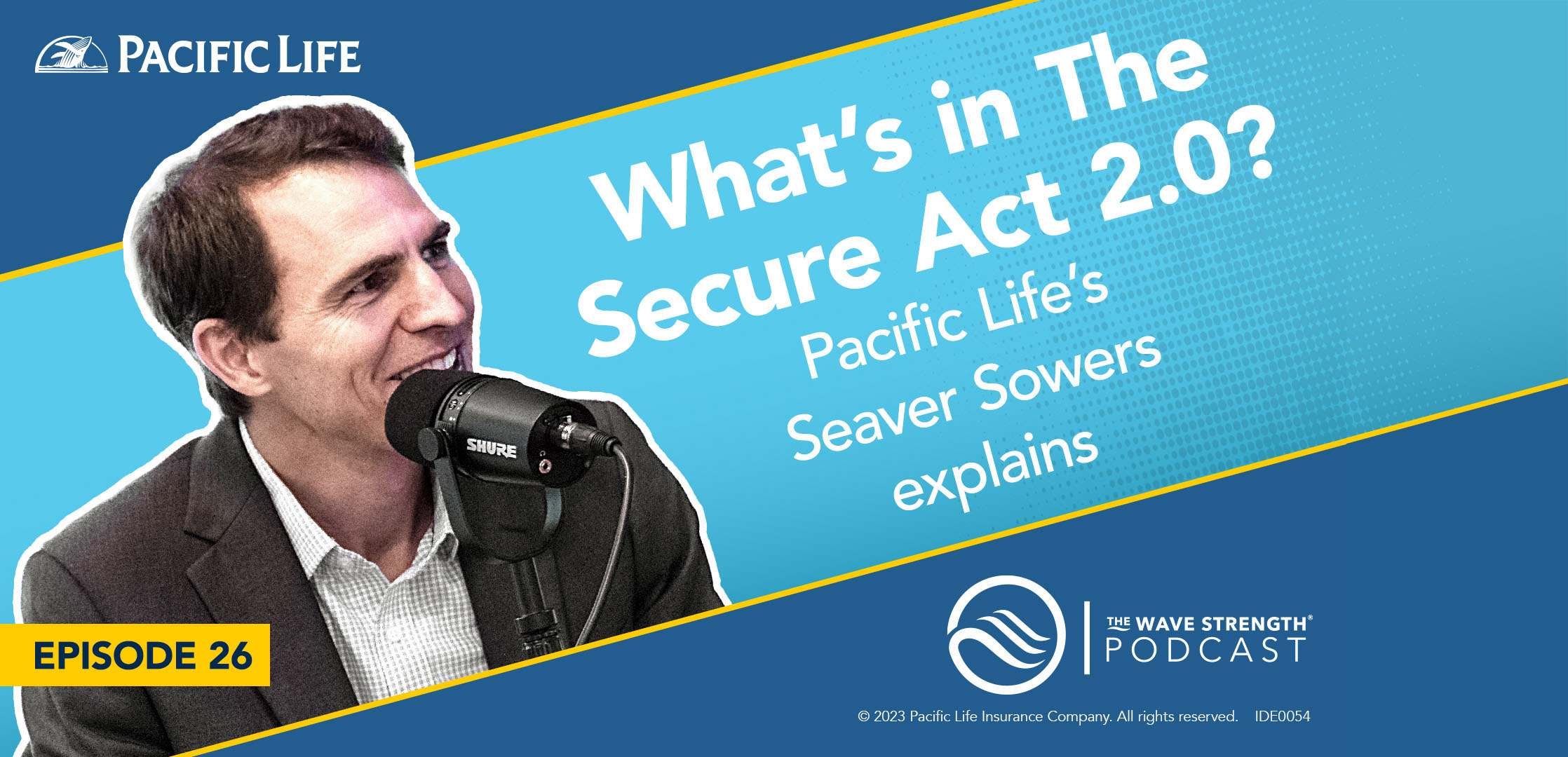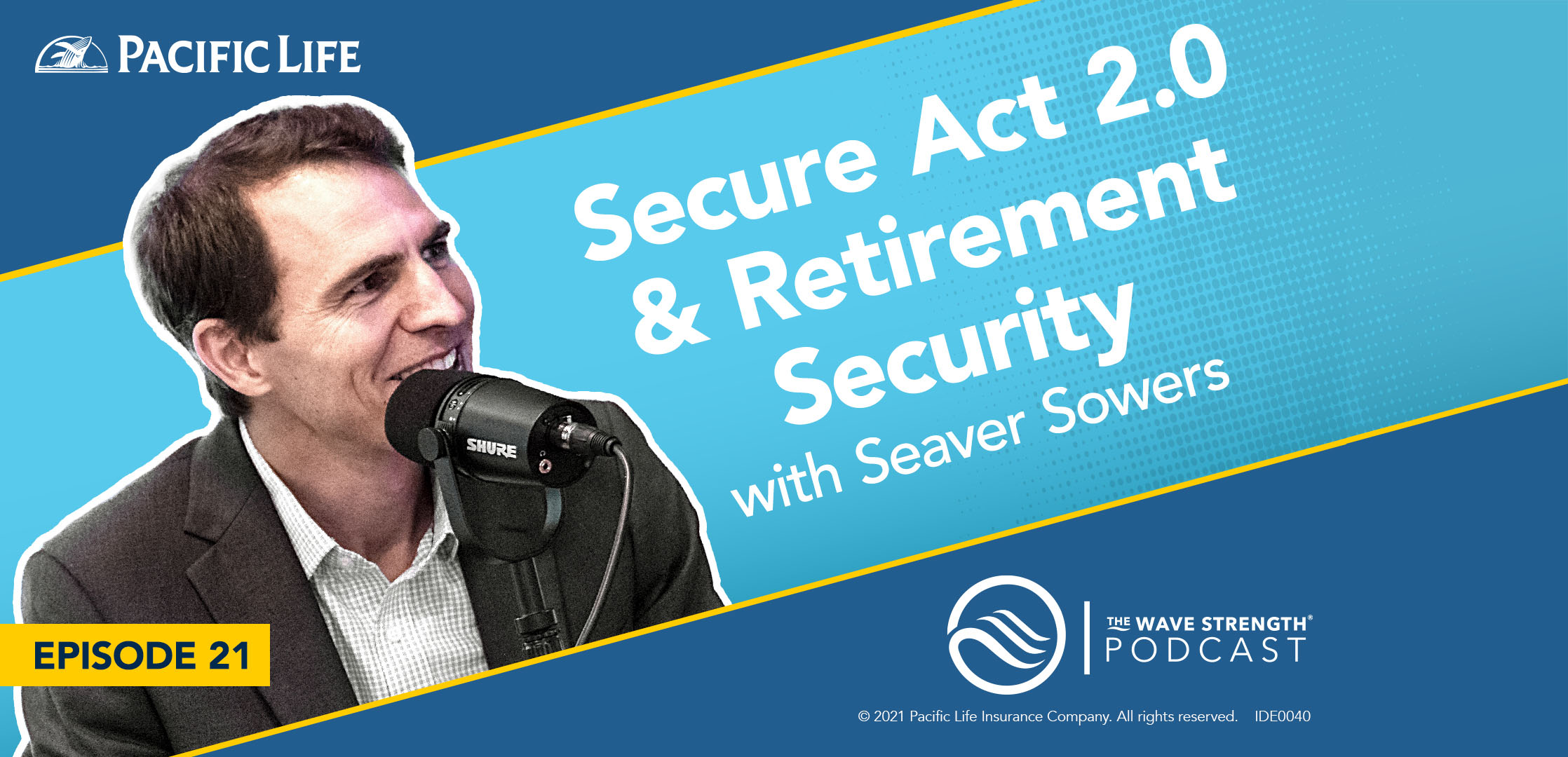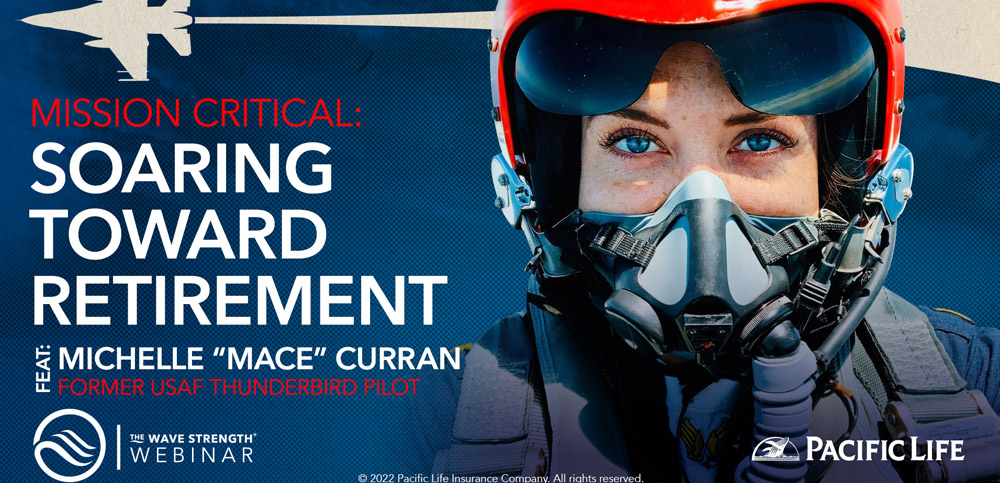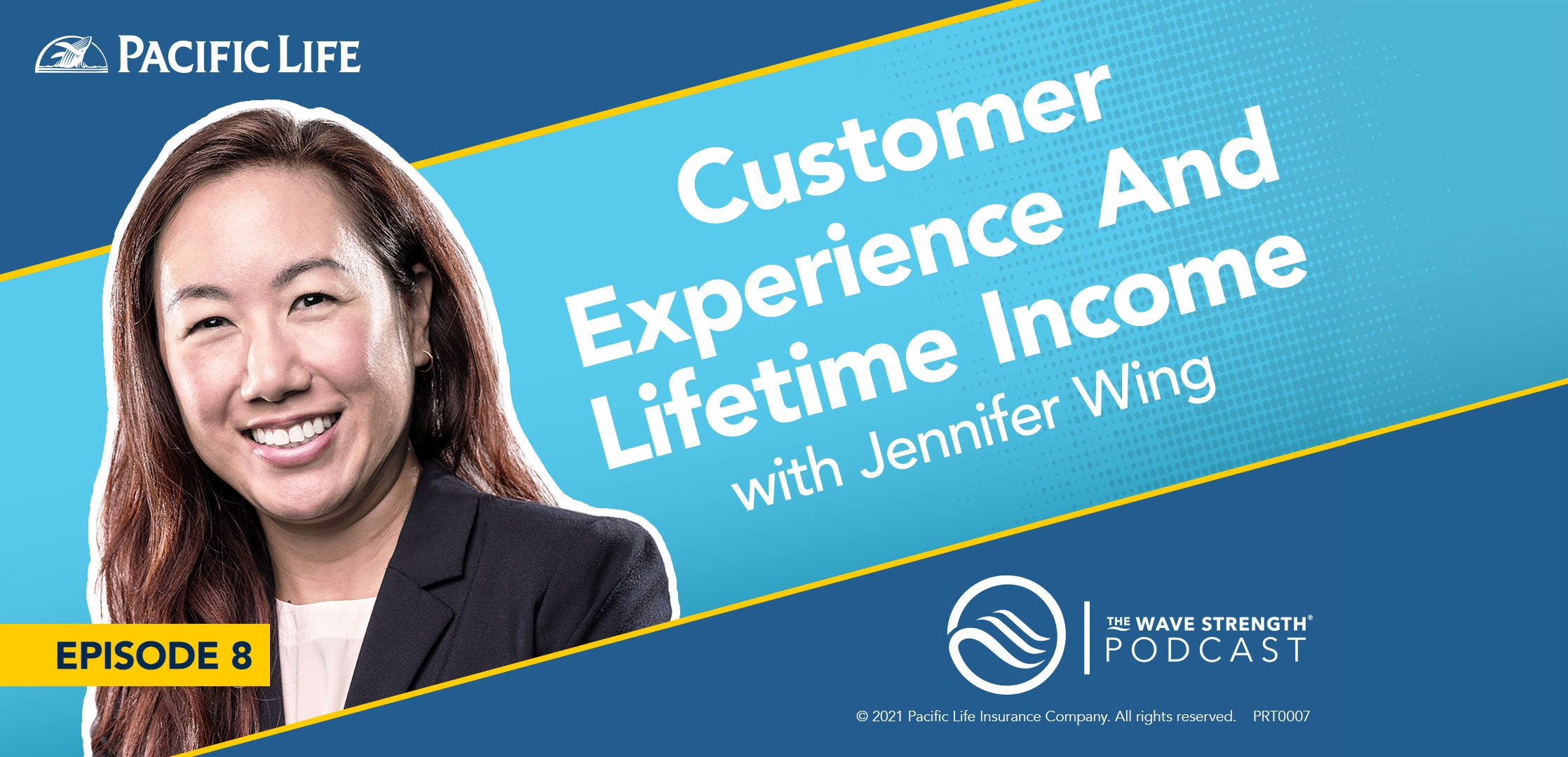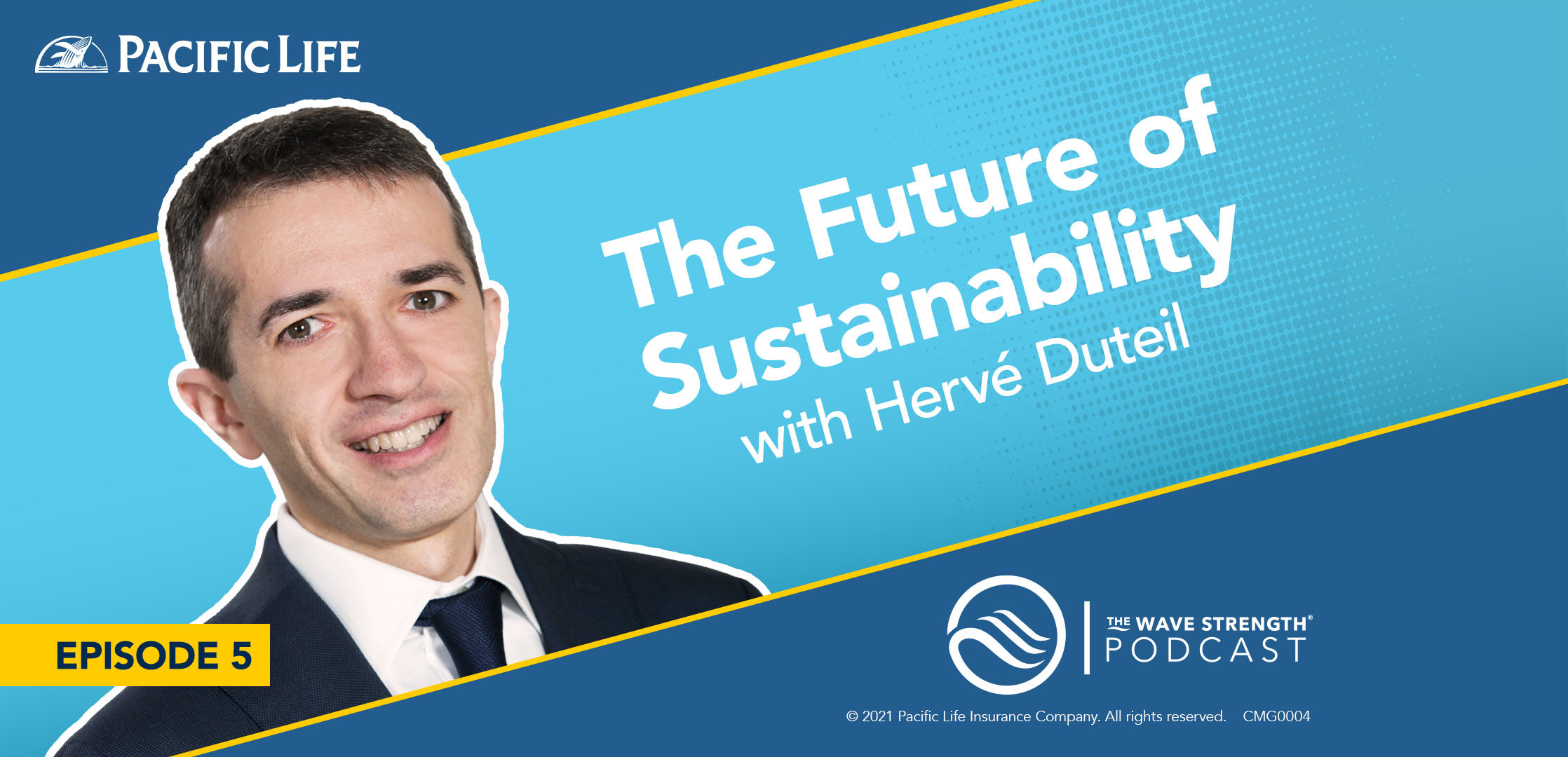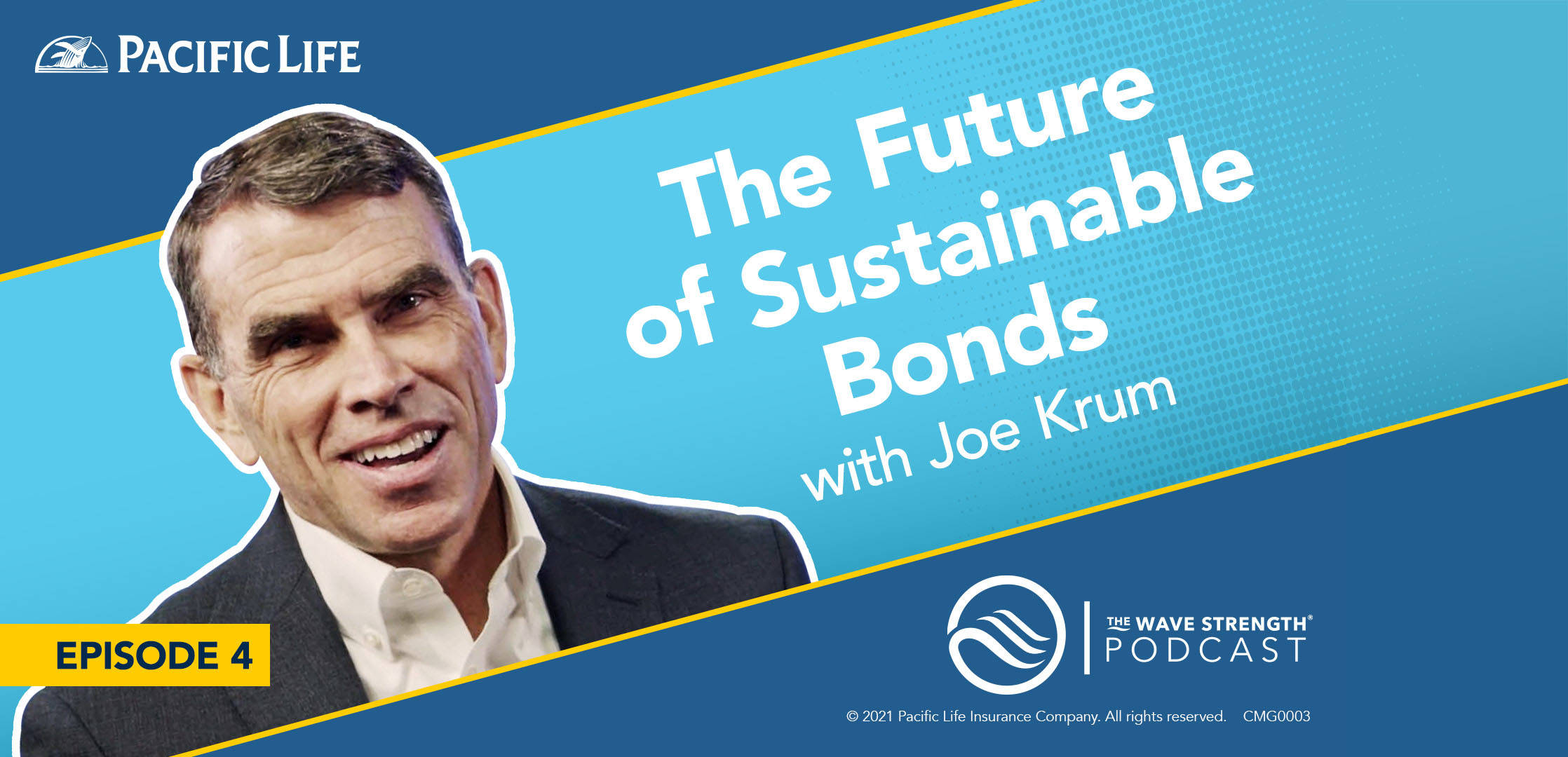Chris: Meeting Bonnie Treichel from Endeavor Retirement.
Bonnie: Thanks so much for having me. I'm excited to be here.
Chris: What advisors, consultants, and plan sponsors are saying about lifetime income solutions.
Bonnie: How do we just take this super complicated thing and let's just make it easy.
Chris: And more about the RIK certification program.
Bonnie: And I had the opportunity to develop the curriculum for these programs and then work with the education team to really bring that to life.
Chris: All this and more on today's episode of The Wave Strength.
The Wave Strength: Welcome to The Wave Strength. Innovative Solutions for a secure retirement presented by Pacific Life.
Chris: Hello, and welcome to another episode of the Wave Strength Podcast. I'm your host today, Chris McGlynn. And with me today is founder and chief solution officer of Endeavor Retirement, Bonnie Treichel.
Chris: Hello, Bonnie. How are you today?
Bonnie: I'm well, thanks so much for having me. I'm excited to be here.
Chris: Bonnie, I appreciate how involved you are with so many facets of the retirement plan industry. Most recently, I know that you've spoke with the ERISA Advisory Council and are a big proponent in the industry as a whole.
Chris: I can't imagine that anyone in the audience doesn't, aren't familiar with you at this point, Bonnie, but would you mind spending a moment or two just introducing yourself and and a little bit about Endeavor Retirement?
Bonnie: Absolutely. Once again, thank you so much to you and to the team at Pacific Life for hosting me.
Bonnie: I'm really excited to be here in Southern California. And for those who don't know, my name is Bonnie Treichel. I am the, as mentioned, founder and chief solutions officer of Endeavor Retirement, which is a consulting firm that I started almost four years ago to support retirement plan advisors. I have a slightly non traditional path in that I practiced law for a period of time as an ERISA attorney, went in house and was a chief compliance officer as well as supported a book of retirement plan business. Everything from a startup plan to some billion dollar plans and that was a really, fun experience.
Bonnie: I probably should put fun in like air quotes but that was a fun experience because I was able to see what actually happens with retirement plans, working directly with participants, as well as plan sponsors. And after that, I rolled out of that firm and then was able to eventually start Endeavor Retirement, where I really, the idea was, how can I take what I was doing in house at that larger RIA, and package that up and support as many advisors as possible. And now I have the opportunity to come into contact with lots of different advisors of a variety of different skill sets and knowledge levels. And I do a lot of that work by working through ARA or NAPA as well as some of the relationships at Broadridge and get to work on things like retirement income and some of the things that I've been talking with you and the folks at Pacific Life about.
Bonnie: So I've been doing that as well as practicing law again, we have a sister company Endeavor Law where we also support advisors and others in the financial services ecosystem.
Chris: That's great. Bonnie in, in that. extensive background I'm sure serves as a great base foundation for all of the things that you continually work towards in the industry in, having pieces from each of those,
Chris: I'm sure you bring into each thing that you touch here as well too. And I know on your website a part of that is transforming these complex topics, specifically around governance and other areas into more easily digestible sound bites for a lot of us to understand as this industry takes shape and continues to evolve.
Chris: So would love to, to learn a little bit more. Bonnie, how do you work with advisors in the likes in the industry to bring a lot of these very complex and ever changing concepts to their everyday practice?
Bonnie: Yeah, we work with advisors and others in the ecosystem in a couple of different ways.
Bonnie: But I think one of the things that I'm super passionate about is this notion that anyone who is a working American deserves to have a dignified retirement. And I think that many of us can really get our heads around that same concept, right? It's just, how do we get there for folks? But the idea is and again, I'm guessing you and many others agree is that if we can take these really complicated topics and instead of holding the information, up above and saying, hey, I have the information and I'm keeping it away from plan sponsors or participants.
Bonnie: But rather, how do we just take this super complicated thing and let's just make it easy. And I'm not trying to oversimplify things or pass over the details because sometimes the devil is in the details. But if we can actually just take the complicated thing and really break it down, because different stakeholders need to focus on different areas.
Bonnie: Advisors are well positioned to focus on those investment pieces, and TPAs are well positioned to dig into the details of some of those Secure 2. 0 provisions. But plan sponsors, I talk to them about hiring the right partners. And when we think about things like retirement income there are so many different solutions out there.
Bonnie: But we don't have to have every single person digging into the details. We can all partner and collaborate and bring our best skills and talents to make sure that the end participant gets what they need. So if we take the complex, make it simple, have everyone bring their best skill sets to the table, we can really get to the best outcomes for participants.
Bonnie: And so, we do that in a variety of different ways. Our model is really meant to support advisors and meet them at the price points where they're able to really have resources available, support their plan sponsors, offer fiduciary training be able to like brand and white label resources. And then we have more custom consulting engagements where that makes sense too.
Bonnie: That's really what we're trying to do to help advisors, their plan sponsors and their participants.
Chris: And that sounds like a huge value add because, that's one piece of the day to day of an advisor who has so many different, arrows in their quiver, so to speak. And to have an expert like that to, that they can lean on to help them I'm sure is hugely beneficial.
Chris: And on the onset of this podcast episode, I know I mentioned your recent testimony at the ERISA Advisory Council and the need that you brought up to have a formalized due diligence process as part of that, when it comes to selecting lifetime income options and the importance of that and based on market research and, what you're hearing from advisors and consultants concerning retirement income what, seems to
Chris: surface more than anything else? Is there a theme that you continually hear, or is it it does it spread across the gamut of different reasons? What the impediments are for this due diligence process.
Bonnie: Yeah, really good question. So one of the things you mentioned is I had the opportunity, myself along with Tom Clark from the Wagner Law Group, to be able to go to the ERISA Advisory Council, where they're really seeking input to better understand one: What's going on with retirement income? Two, should it be part of a QDIA or not? And three, what is really the landscape of what folks are doing for QDIA and QDIA due diligence? So we had the opportunity to go and present to the ERISA Advisory Council back in July, and that was a really great experience, great learning experience as well, because I don't generally present in that sort of format as much where,
Bonnie: people get to ask me questions for a good portion of the time. Usually, I speak to groups, and then I get to choose which questions I answer. So that was a fun experience. But one of the things you just ask is, what are the impediments to retirement income, and specifically around this due diligence process?
Bonnie: And I think it depends on which stakeholder we're talking about. So I would suggest that we've got two different stakeholders, right? We've got the advisor group because they're often a fiduciary to making these recommendations, but we also have plan sponsors and both are really looking for some guidance on what is this process that I need to follow to, or to make a recommendation, if I'm in the advisor's shoes? Or if I'm in the plan sponsor's shoes, what's the process I need to follow to select one of these many solutions that's out there from this retirement income pool, which is changing very quickly? And for both of them, neither one wants to be sued, right? And I think we were chatting about that earlier today, that no one wants to be sued.
Bonnie: So that's like hurdle number one. But then each of them has different things that they're dealing with in terms of what are the real issues they're trying to combat. If I'm in the advisor's shoes, one thing I'm really concerned about is probably, just logistically speaking, portability.
Bonnie: I don't want to make a recommendation of a solution to put XYZ solution on a platform. Then I need to go move record keepers five years from now, but now I've got portability problems moving to a new record keeper. That's a good way for me as the advisor to get fired or get someone unhappy with me because I recommended this.
Bonnie: Now I'm stuck on this record keeper. And then basically the problems of the record keeper becomes the advisor's problems too, right? That's, a big one still, and I think that is changing really fast. Today, that's a problem. If I'm the plan sponsor, and I think we've shared some of this just anecdotally, plan sponsors have so many things they're responsible for, right?
Bonnie: And this probably depends on the market segment, but if I'm thinking of my day to day role, and I'm wearing that like HR hat or something like that, I don't want one more thing that I've got to answer questions about or I've got to do. So again, it's just like, you really have to show me some good value I'm going to get for this, and you've got to make it so easy for me.
Bonnie: I don't want one more thing I have to do. So I think that's just a big thing, and especially since COVID still, I see a lot of turnover in committees. I do a lot of basic fiduciary training, with a lot of committees, especially in probably that sub 250 million market. And it's just still back to basics as opposed to let's tackle this new topic.
Bonnie: So I think it's, how can we keep it simple for that market? Whereas on the advisor shoes, it's more dealing with things like portability. How do we address expense? So just maybe different issues, depending on the segment and what stakeholder.
Chris: Yeah, that is so well explained, Bonnie, and it's it resonates with exactly I think what we're seeing in the market to it as part of the conversations as well, which is folks at a certain point.
Chris: They know that this is the right option. In a lot of cases, they just aren't sure of how to go about it, right? And I think what you've just outlined is, are examples of that. Hypothetically speaking, if I'm an advisor that is, having these initial conversations with my client about income options what, guidance might you share with someone like myself who's beginning?
Chris: These conversations with, my client who has a certain level of interest, but also being aware of all the things that you just mentioned liability, additional workloads, et cetera. What guidance would you offer?
Bonnie: Yeah. So if I'm the advisor and I want to start the conversation around income with a plan sponsor, I think there's a couple of things to keep in mind.
Bonnie: Number one, this is about a problem that the plan sponsor is trying to solve. This is not a solution conversation. So what is it that the plan sponsor is trying to address? How do we help plan sponsors address issues for their future? So it's about are they trying to attract and retain talent?
Bonnie: Are they trying to help people retire on time? Do they really, a lot of plan sponsors, they really want to do the right thing for their people. And some of that, and this is getting into some more technical stuff, but some of this is more of it's the business owner or that settler who's saying, I really believe in taking care of my people.
Bonnie: This is getting off on a total tangent, but. If you look at people turn to a couple of different institutions in society and it's either religion or churches, it's the government, or it's their employer in many cases. And over time, a lot of data shows that, and I wish I had the stats in front of me, but a lot of data shows that over time, folks have turned more towards their employer as that source of like their community and taking care of them.
Bonnie: And so it's a lot of employers have embraced that and they want to take care of their people. If you're an employer who wants to take care of their people, this is the type of work that does that, right? And so the question is, if I'm an advisor and I'm introducing this topic, how am I doing that?
Bonnie: I'm solving a problem for people and I'm doing it at a more cost effective way than saying, you know what, let's just go back to a DB plan for you, right? People didn't turn away from DB plans because they just didn't want to take care of their people. It was just too expensive. So let's just get the pendulum not all the way back to the other direction, but let's just meet in the middle.
Bonnie: And so I think it's about Let's solve a problem. Let's meet in the middle there. But then once we get past that, then we layer on that next piece of communication. And it's, let's keep this conversation simple. Let's meet the plan sponsor where they are, but then let's think about, where philosophically can we narrow down this universe of all the options out there and think about how to create a conversation that can walk the plan sponsor through this?
Bonnie: We're not going to take 30 options to the plan sponsor and say, all right, let's go through a due diligence process and start at square one, but we're going to talk about, do you want something as a default versus an option that a participant can elect? How do you want this to look and feel for your people?
Bonnie: And that can narrow down our options. The advisor can go and run through a due diligence process and partner and reach out to folks like you or other partners in the industry. There's lots of tools coming to market that they can use. And that's, I think, how that conversation can progress. And it doesn't have to be too overwhelming.
Bonnie: And again, I don't. I don't want this to sound like, hey, I listened to this ERISA attorney and she just glossed over every single detail about how this thing actually works. I don't mean to do that, but I think, again, if we go back to, if you have the right partners and people in the right places bringing their expertise, the advisor doesn't have to know everything about annuities, nor does the plan sponsor.
Bonnie: Different people can play different roles to bring this to life.
Chris: Having that, point A to point Z level of communication to talk about this is so incredibly important. I couldn't agree more to Bonnie. I believe you and I could sit here for the next, I don't even know how many hours, but we could continue to talk about this and, go through each of these details and, either of us would be happy to with anyone who would love to, to learn more.
Chris: But I, what you've shared, I, it gives a great picture and really starts to paint the picture of how these complex conversations on the surface can really be boiled down to different buckets of information to make a decision for a plan sponsor in, just navigating them.
Chris: And I know this reminds me, Bonnie, of the, work that you've done putting together the curriculum with ARA, for advisors and also for plan sponsors. And that does go deeper into the things that you just shared. Maybe just briefly, would you mind giving us a little bit more on the work that you've done with ARA?
Bonnie: Absolutely. I think one of the really cool things that I've seen in the last, I can't believe it's five years since 2019 when we saw SECURE Act pass the first one. But with the first passage of Secure, we saw this spark around income because of the safe harbor. And so you saw all these different products and partners come to life with new solutions. And I think the exciting thing about that is that we saw the development of what's called the Retirement Income Consortium and a bunch of partners come together. And then you saw the same partners who, they're competitors, right? You have competing solutions in the marketplace, but you all came together and are continuing to come together because there's a recognition that there's a multi level approach. If we're going to help the end participant, there's this multi level approach, which doesn't start with your products. It starts with, we have to educate one really the community at large getting on the same page with what are we calling these things and if we have all these different terms and terminology, we can't get to that next level of we have to educate the advisor and consultant community and they have to understand and be educated on what are these new solutions and what is the safe harbor and what is this due diligence process, and then they're going to go educate their plan sponsor clients and plan sponsors have to be armed and equipped to educate participants.
Bonnie: And so it's been really cool to see what I historically, pardon me, have always seen as, hey these are competitors. You're coming together. This whole notion of rising tides lift all boats. And, so through NAPA and now with PSCA. So these are sister organizations of the American Retirement Association.
Bonnie: There have been a couple different programs, one for advisors, and now the, development of one for plan sponsors, just pure education. This is objective. It's not pushing any products, pure education to say, hey you can get a certificate that identifies you have knowledge in this subject. And you can learn about retirement income solutions.
Bonnie: You can learn the terminology, you can learn about a prudent process, and you can learn a basic communication strategy. And there's more to it than that. But I think it's been really fun to watch partners come together, and I had the opportunity to develop the curriculum for these programs and then work with the education team to really bring that to life.
Bonnie: And, you'll see the one with PSCA come out this coming spring at the PSCA National Conference. So really excited and excited that Pacific Life's a partner to that.
Chris: Yeah, love being a part of it. That it's great work that you, Bonnie, and many, as you point out the notion of rising tides raise all ships is it could not be further from the truth. It is it holds so much weight and It is a very nice thing to see and I've heard the term coopetition a few times come out and it's It's nice when folks can bond together from across all these different entities for the end participant knowing that this is the right thing.
Chris: Bonnie, thank you so much for all the work that you've done with this curriculum and anybody that's listening in the audience. If you haven't yet checked out the ARA curriculum for advisors or plan sponsors that will be coming soon, I would recommend taking a look at it. One of the gold standards, I'd say right now in the retirement industry, as far as learning more about these types of solutions.
Chris: But Bonnie, thank you so much again for joining us. Thank you for all that you do, to move this industry forward. Whether it's with the regulators or your engagement speaking to, experts in the industry. It is really work that is, is helping to move us all forward in the retirement income space, so thank you for that, Bonnie. Great having you here today and to all the viewers, thank you for joining The Wave Strength podcast today. Again, Bonnie Treichel from founder and chief solutions officer from Endeavor Retirement. I'm Chris McGlynn, the host today on The Wave Strength podcast. If you'd like to learn more, please click and subscribe below and follow other podcasts in the future.
Chris: Thank you all, and thanks for listening.
The Wave Strength: This has been another episode of the wave strength presented by Pacific Life. Don't forget to catch us on YouTube, and make sure to subscribe. Although this podcast is presented by Pacific Life, the opinions and views expressed are those of the hosts and participants, and do not necessarily reflect Pacific Life's views on any of the topics discussed.
The Wave Strength: Unless otherwise noted. Pacific Life is unaffiliated with any other individual or company mentioned. Pacific Life is a product provider. It is not a fiduciary and therefore does not give advice or make recommendations regarding insurance or investment products. Pacific Life, its affiliates, its distributors, and respective representatives do not provide any employer sponsored qualified plan administrative services or impartial advice about investments and do not act in a fiduciary capacity for any plan.
The Wave Strength: Pacific Life refers to Pacific Life Insurance Company and its subsidiary, Pacific Life & Annuity Company. Insurance products can be issued in all states except New York by Pacific Life Insurance Company and in all states by Pacific Life & Annuity Company. Product availability and features may vary by state.
The Wave Strength: Each insurance company is solely responsible for the financial obligations accruing under the products it issues. This podcast was recorded on September 4th, 2024.
Jim: Thanks for joining us on today's show. We'd love to hear from you. Join the conversation below and leave a comment on your thoughts on what the industry can do better for participants as it pertains to lifetime income solutions. And if you'd like more interesting content, click one of these links over here.


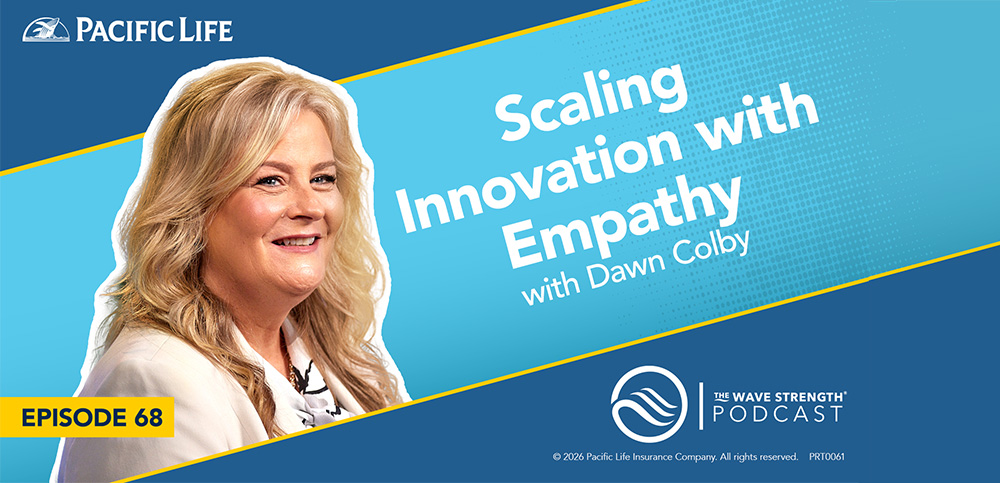
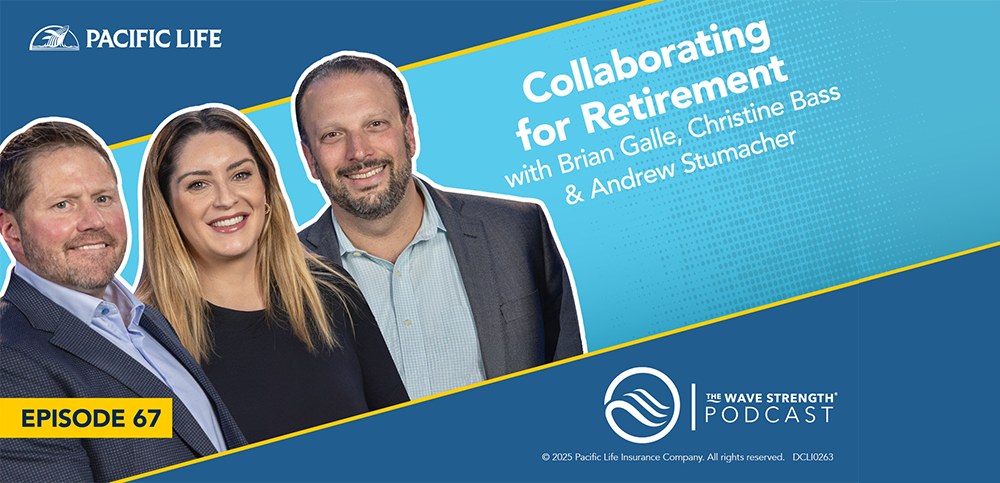
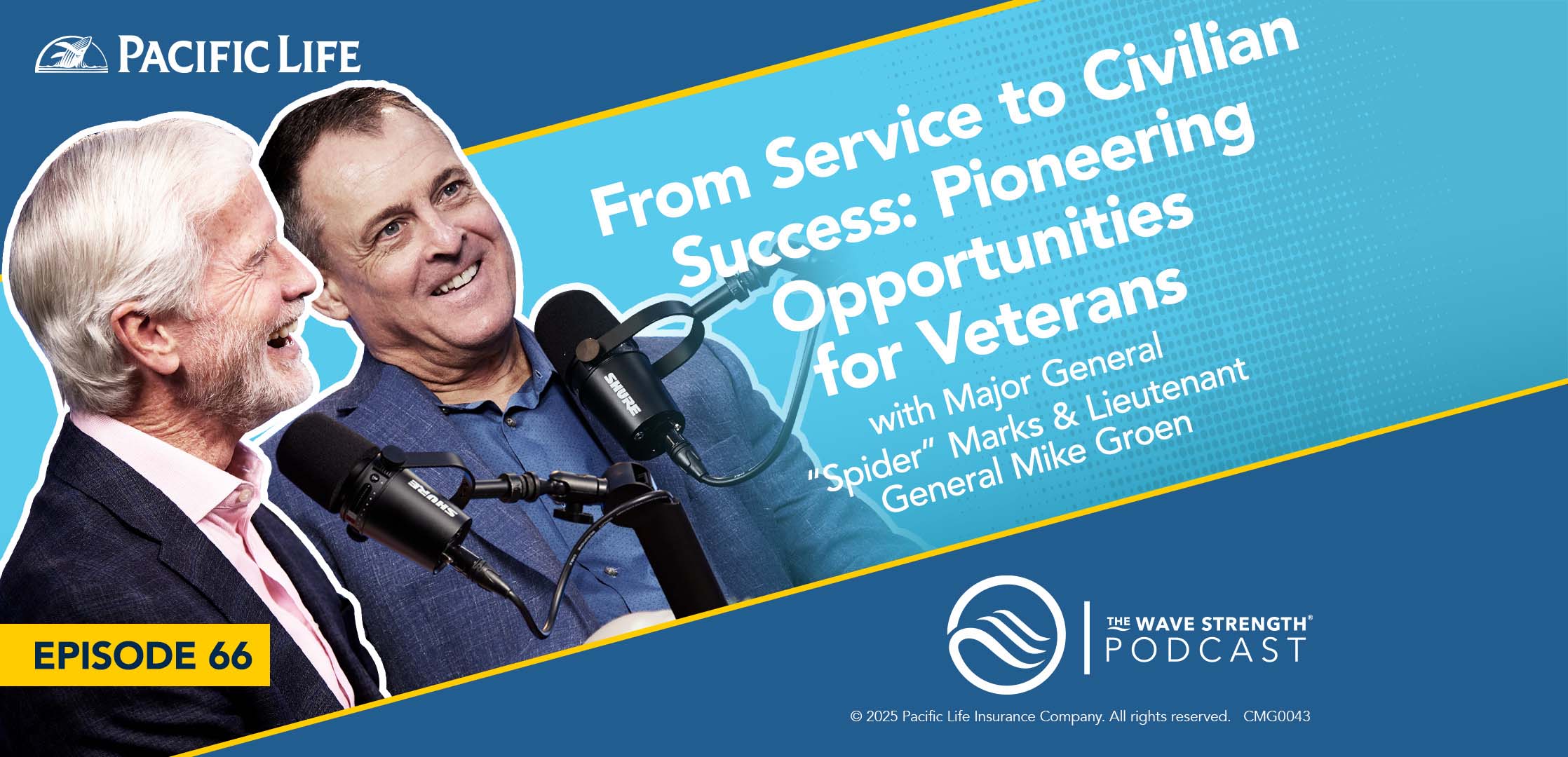
.jpg)

